lundi, 10 mars 2025
Trump, les néocons et l'inversion du projet interventionniste mondialiste
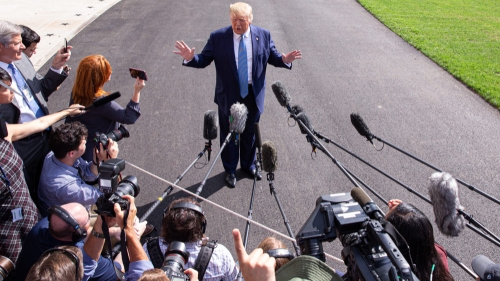
Trump, les néocons et l'inversion du projet interventionniste mondialiste
Donald Trump est en train de revenir sur la politique interventionniste néoconservatrice, estime Frank-Christian Hansel dans son commentaire pour LIBRE. Le président américain offre ainsi à l'Europe une chance d'autonomie en matière de politique de sécurité.
par Frank-Christian Hansel
Source: https://www.freilich-magazin.com/welt/trump-die-neocons-u...
Depuis des années, Donald Trump est présenté par les politiciens mainstream et les médias européens comme un danger pour l'Occident. Sa critique de l'OTAN, son aspiration à une solution diplomatique en Ukraine et son rejet des projets mondialistes sont interprétés comme les preuves d'une volonté de détruire les valeurs de la communauté occidentale. Mais cette présentation méconnaît le véritable cœur de son programme politique, dans l'intérêt également du contribuable américain. Trump ne démantèle pas l'Occident, mais fait marche arrière sur un projet d'intervention néoconservateur qui a impliqué les États-Unis et l'Europe dans diverses guerres. Son objectif n'est pas l'isolationnisme, mais une réorientation pragmatique de la politique américaine, qui offre également à l'Europe une chance historique d'accéder à la souveraineté.
Les néocons et leur projet géopolitique
Le mouvement néoconservateur a marqué la politique étrangère américaine depuis les années 1990. Leur objectif était l'hégémonie incontestée des Etats-Unis, imposée par des interventions militaires ciblées et des changements de régime. La doctrine Wolfowitz de 1992 a fixé l'objectif stratégique d'étouffer dans l'œuf toute concurrence géopolitique. Le Project for the New American Century (PNAC) a exigé une politique d'intervention agressive, qui s'est exprimée dans les guerres en Irak, en Afghanistan et en Libye. L'Ukraine, en particulier, a joué un rôle décisif dans ce processus. Depuis 2014, elle a été systématiquement intégrée dans la sphère d'influence occidentale, le renversement du Maïdan a été activement soutenu, comme le prouvent des documents désormais publiés par l'autorité patronnée par Musk, et le pays a été positionné comme tampon géopolitique contre la Russie. Cette stratégie est l'expression du récit initial, celui du « Heartland » de Halford Mackinder, qui considère le contrôle de l'Europe de l'Est comme la clé de la domination mondiale.
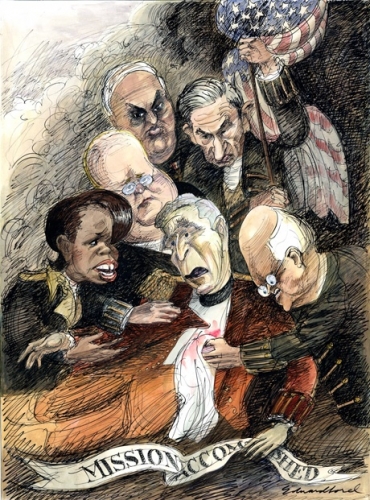
Cette politique d'expansion permanente et de démonstration de force militaire n'a toutefois pas apporté la stabilité, mais la déstabilisation à long terme - et était d'ailleurs tout sauf « basée sur des règles » ! Les conséquences des guerres au Proche-Orient et de la politique de confrontation avec la Russie ont été considérables pour l'Europe: mouvements migratoires, bouleversements économiques et dépendance militaire croissante vis-à-vis des États-Unis.
Trump comme contre-modèle : « America First » au lieu de l'interventionnisme mondial
Dès le début, Trump s'est opposé à cette orientation. Durant son mandat, il a empêché une nouvelle intervention militaire à grande échelle, a retiré les troupes américaines des zones de conflit et a privilégié les négociations plutôt que l'escalade. Sa critique de l'OTAN a souvent été présentée comme une intention malavisée d'affaiblir l'alliance occidentale, alors qu'elle visait à libérer l'Europe de sa dépendance vis-à-vis des États-Unis en matière de politique de sécurité. Son approche était claire: les États-Unis devraient se concentrer sur leurs intérêts nationaux au lieu de mener d'interminables guerres par procuration pour un ordre mondial qui sert avant tout les néocons.
Sa divergence sur la question ukrainienne était et reste particulièrement frappante. Contrairement à l'establishment de la politique étrangère, qui considérait le conflit comme une opportunité géopolitique, Trump a voulu rechercher une solution diplomatique dès 2019. Il a reconnu que la guerre ne pouvait pas prendre fin par des sanctions ou des livraisons d'armes, mais par des négociations qui tiendraient également compte des intérêts de sécurité russes. Cela signifiait toutefois un défi direct à la stratégie néoconservatrice.

La guerre en Ukraine, un test pour les intérêts géopolitiques
Dans ce contexte, la guerre d'Ukraine n'est pas simplement une escalade géopolitique spontanée, mais le résultat d'une stratégie néocon de longue date. Dès 2008, le projet d'élargir l'OTAN à la Géorgie et à l'Ukraine a provoqué des tensions de grande ampleur avec la Russie. Le renversement de Maïdan en 2014 n'était pas seulement un événement interne à l'Ukraine, mais le produit de l'influence occidentale, que la Russie a perçu comme une menace existentielle. La guerre à partir de 2022 - sans que cela puisse être lu comme une justification - était alors la conséquence logique d'un conflit par procuration qui s'était construit au fil des années. Trump reconnaît ce contexte et veut mettre fin à la guerre, non pas par sympathie pour Poutine, mais parce qu'il considère l'escalade comme une impasse stratégique.
C'est justement là que le conflit central entre Trump et l'establishment transatlantique/atlantiste apparaît. Ceux qui ont œuvré depuis des décennies à une confrontation militaire avec la Russie voient Trump comme une menace pour leur ordre géopolitique. Sa diplomatie est stigmatisée comme une trahison, ses efforts de paix sont considérés comme une faiblesse.
Ce n'est pas pour rien qu'il insiste sur le fait que cette guerre n'aurait jamais dû être déclenchée et qu'elle n'aurait pas eu lieu sous son égide. Il ne s'agit pas de valeurs, mais d'intérêts économiques et stratégiques solides. Le complexe militaro-industriel profite d'un conflit durable, et l'Europe, en tant que vassal géopolitique, est manœuvrée dans une situation qui sape sa souveraineté.
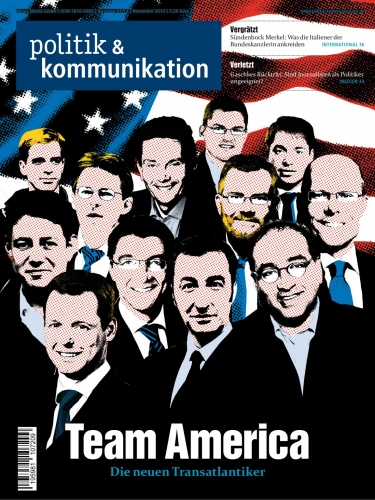
La position allemande : prisonnière du récit transatlantique ?
Dans ce débat, l'Allemagne en particulier révèle une désorientation stratégique. L'élite politique à Berlin, en particulier les transatlantiques d'inspiration ouest-allemande, représentés de Merz à Gabriel, continue finalement - qu'ils en soient conscients ou non - à s'accrocher aux concepts de l'ère néocon et à interpréter les bouleversements géopolitiques actuels non pas comme une opportunité de réorientation, mais comme une menace. Au lieu de considérer le cours de Trump comme une possibilité d'émancipation de l'Europe, la politique étrangère allemande s'accroche à une fidélité à une alliance dépassée et à une obéissance aveugle à Washington.
C'est pourquoi l'administration Trump, avec des figures comme Vivek Ramaswamy et Elon Musk, cherche logiquement à dialoguer avec les forces d'opposition aux formations politiques partisanes de l'euro-mondialisme en Europe, notamment avec des mouvements souverainistes comme l'AfD ou avec des personnalités comme Victor Orban. Alors que la politique allemande en place reste ancrée dans le vieux mode de la pensée transatlantique, l'AfD reconnaît la nécessité d'un véritable changement d'époque: s'éloigner de la dépendance militaire et de la gestion géopolitique étrangère pour s'orienter vers une politique européenne autonome en matière de sécurité et d'économie.

La chance géopolitique pour l'Europe: émancipation ou vassalité?
C'est pourtant là que réside la chance. Trump ne détruit pas l'Occident, mais donne à l'Europe la possibilité de s'affranchir de la tutelle des Etats-Unis en matière de politique de sécurité. Si les États-Unis se retirent de leur rôle de puissance protectrice mondiale, cela ne signifie pas l'effondrement de l'Occident, mais la nécessité d'une véritable ré-appropriation européenne. L'Europe pourrait développer une politique de sécurité autonome au lieu de continuer à se soumettre inconditionnellement à la doctrine américaine.
Cette émancipation aurait plusieurs avantages :
- Une plus grande autonomie stratégique: l'Europe pourrait développer sa propre politique de défense sans dépendre en permanence de l'approbation de Washington.
- Un rôle de médiateur diplomatique: une Europe indépendante pourrait servir d'intermédiaire entre les Etats-Unis, la Russie et la Chine, au lieu de se laisser entraîner unilatéralement dans des confrontations géopolitiques.
- Les intérêts économiques avant l'idéologie: l'Europe pourrait mener une politique économique pragmatique qui ne soit pas minée par des sanctions et des guerres commerciales avec de grands acteurs comme la Chine et la Russie.
Au lieu de cela, de nombreux gouvernements européens entendent demeurer dans un état de vassalité, où toute initiative stratégique personnelle est étouffée dans l'œuf. C'est particulièrement visible dans la question ukrainienne: alors que Washington négocie une éventuelle fin de la guerre, les élites européennes continuent d'exiger une escalade à tout prix. Cette myopie pourrait s'avérer fatale si les Etats-Unis entament effectivement un retrait et si l'Europe est confrontée aux conséquences de sa propre dépendance.
Conclusion : Trump comme correctif de l'ordre mondial
Trump ne met pas fin à l'Occident - il donne à l'Europe l'occasion de développer enfin sa propre identité géopolitique. Les années à venir montreront si l'Europe reconnaît les signes du temps ou si elle continue à s'enfermer dans d'anciennes structures de dépendance. Il en va de même pour l'Allemagne, quelle que soit la personne qui la gouvernera à l'avenir.
19:00 Publié dans Actualité, Affaires européennes | Lien permanent | Commentaires (0) | Tags : actualité, europe, affaires européennes, donald trump, états-unis, otan, atlantisme, politique internationale |  |
|  del.icio.us |
del.icio.us |  |
|  Digg |
Digg | ![]() Facebook
Facebook
vendredi, 07 mars 2025
Les politiques de Donald Trump et les analogies historiques
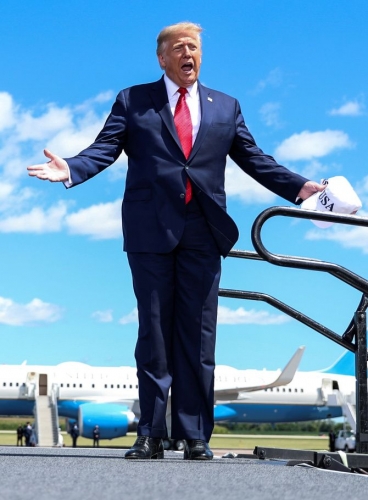
Les politiques de Donald Trump et les analogies historiques
Leonid Savin
Après le retour de Donald Trump à la Maison Blanche, de nombreuses comparaisons avec les précédents présidents américains ont commencé à être énoncées. Pour la plupart, les commentateurs ont souligné que c'était la deuxième fois qu'un candidat ayant fait une pause entre deux mandats présidentiels devenait président pour un second mandat. La première fois, c'était avec Stephen Grover Cleveland (1885-89 et 1893-97, qui fut respectivement le 22ème et 24ème président). La comparaison avec Cleveland s'arrête là. Il s'agissait d'ailleurs d'un représentant du parti démocrate.
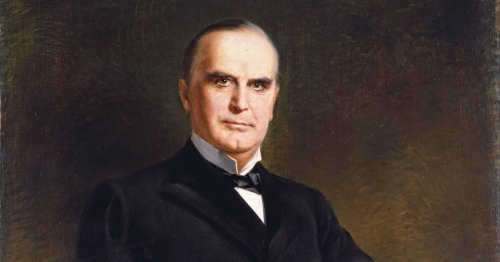
Le sociologue argentin Atilio Boron a attiré l'attention sur un autre personnage: William McKinley (tableau, ci-dessus), président des États-Unis de 1897 à 1901, qui a succédé à Cleveland. Et les comparaisons ne manquent pas. McKinley était un républicain et, sous sa présidence, les États-Unis ont considérablement accru leur puissance régionale. Les îles Hawaï ont été annexées, une guerre avec l'Espagne s'en est suivie et Washington a pris le contrôle de Porto Rico, de Guam, des Philippines et de Cuba. L'histoire de Cuba, qui menait à l'époque une guerre d'indépendance contre l'Espagne, est particulièrement intéressante. Les patriotes cubains n'ont pas demandé l'aide des États-Unis, car ils savaient comment cela pourrait tourner (Jose Marti, qui est mort au début de la troisième guerre d'indépendance, avait également mis en garde contre cette éventualité). En février 1898, les États-Unis ont introduit le cuirassé Maine dans la baie de La Havane, qui a étonnamment explosé quelques jours plus tard. Bien entendu, l'Espagne a été blâmée, même si elle a pris une part active à l'enquête.
La bravade similaire de Trump concernant la possibilité de prendre le contrôle du canal de Panama, d'acquérir le Groenland et d'incorporer le Canada aux États-Unis offre certains parallèles avec les activités de McKinley.
Dans l'ensemble, pour les pays d'Amérique latine dans le cadre de la stratégie de la Doctrine Monroe 2.0, cette comparaison entre Trump et McKinley a du sens.
Bien qu'il existe un autre personnage plus proche de Trump, à la fois dans l'esprit et dans le temps. Et du côté de la Russie, à la lumière des expériences négatives, il suscite également une certaine méfiance. Il s'agit de Ronald Reagan. D'ailleurs, Trump a connu Reagan personnellement et le considérait comme son idole politique. Quelles sont les comparaisons entre ces dirigeants?
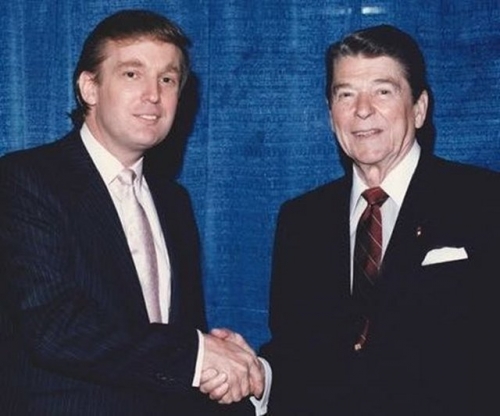
Tout d'abord, tous deux étaient des outsiders politiques mais ont réussi à gagner les votes de la majorité des Américains. Tous deux ont fait l'objet de tentatives d'assassinat (Reagan a été plus gravement blessé que Trump, qui s'en est tiré avec une égratignure à l'oreille).
Et le slogan « Make America Great Again » nous vient de Ronald Reagan.
En outre, dans le domaine des guerres tarifaires, Reagan a imposé des droits de douane de 100% sur les produits électroniques japonais, restreignant ainsi efficacement le flux de marchandises en provenance de son satellite. Trump a fait la même chose, mais à plus grande échelle.
En outre, la déclaration de Donald Trump sur la nécessité de créer un « Dôme de fer pour l'Amérique » basé sur la révision du système de défense antimissile et l'implication de l'US Space Force (créée pendant le premier mandat présidentiel de Donald Trump) fait clairement écho à l'Initiative de défense stratégique de Ronald Reagan. Bien que datant des années 1980, cette initiative s'est soldée par un échec, les entreprises de défense en ayant profité. La détente avec l'Union soviétique a conduit à la réduction des armements, puis à l'effondrement de l'URSS. La défense contre les missiles nucléaires soviétiques n'était plus nécessaire, et les États-Unis ont directement contrôlé leur destruction, ainsi que le retrait des porteurs et des ogives existants de l'Ukraine, du Belarus et du Kazakhstan indépendants.
Les négociations actuelles entre les États-Unis et la Russie soulèvent également la question suivante: un scénario similaire pourrait-il se reproduire, lorsque Washington, animé de bonnes intentions, commence à recevoir des technologies russes (par exemple, des vecteurs hypersoniques) que les États-Unis ne possèdent pas? Ce n'est pas un hasard si, après les premiers pourparlers de Riyad, il a été question de coopération dans le domaine de l'espace. Les ressources constituent un autre intérêt possible pour les États-Unis et, là encore, les déclarations sur la coopération dans l'Arctique peuvent s'appuyer sur la position initiale de Washington.
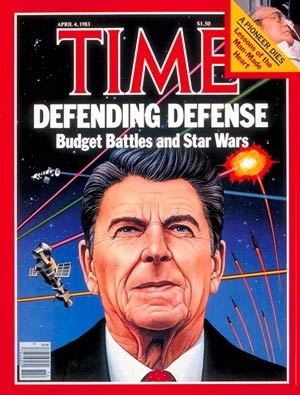
Il existe un autre point commun, non explicite mais très important dans la prise de décision. Il s'agit de la religion. Ronald Reagan et Donald Trump sont tous deux des presbytériens protestants, et gravitent dans des cénacles assez étranges. Par exemple, Reagan était exalté par une secte de dispensationalistes qui interprétaient la confrontation de la guerre froide entre les États-Unis et l'URSS d'une manière particulière et liaient l'apocalypse à la guerre nucléaire. Selon ces croyances, les Américains élus par Dieu et certains Israéliens seraient miraculeusement sauvés après l'Armageddon, après quoi il y aurait une prospérité universelle. En général, le dispensationalisme dans ses diverses interprétations est devenu une sorte de religion civile aux États-Unis, où ses adeptes justifient toutes les actions de Washington en matière de politique étrangère, y compris les interventions militaires, parce que tout est fait « pour le bien de toute l'humanité ». Donald Trump a des opinions similaires, et son « confesseur » personnel est la télé-évangéliste Paula White. Cette pasteure en jupe dirige aujourd'hui le Bureau de la foi de la Maison Blanche.
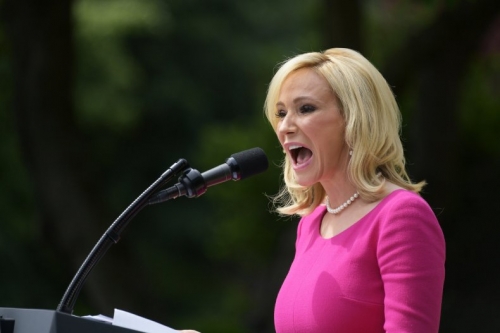
À en juger par ses déclarations, ainsi que par les remarques faites lors d'une rencontre début février avec le Premier ministre Benjamin Natanyahu, elle appartient à un groupe de sionistes chrétiens. Et le soutien de Donald Trump aux actions d'Israël à l'égard des Palestiniens renforce le fait que les opinions religieuses sont à l'origine de certaines décisions politiques.
La différence la plus importante entre les politiques de Reagan et de Trump est peut-être la question des migrations. Le 6 novembre 1986, Ronald Reagan a promulgué la loi sur la réforme et le contrôle de l'immigration. L'effet le plus important de cette loi est qu'elle a permis aux immigrants entrés illégalement aux États-Unis avant le 1er janvier 1982 de demander un statut légal, à condition de payer les amendes et les impôts impayés. Cette disposition, que Reagan lui-même a qualifiée d'amnistie, a permis à environ 3 millions d'immigrants d'obtenir un statut légal en payant 185 dollars, en faisant preuve de « bonne moralité » et en apprenant à parler anglais.
Entre 1980 et 1990, période qui comprend les huit années de l'administration Reagan, la population américaine née à l'étranger est passée de 14,1 millions à 19,8 millions. Cette évolution s'est accompagnée d'une augmentation de 4 millions en provenance d'Amérique latine et de 2,4 millions en provenance d'Asie, et d'une baisse de près de 800.000 âmes venues d'Europe.
Donald Trump fait exactement le contraire. Dès les premiers jours de son second mandat présidentiel, des milliers de migrants illégaux ont commencé à être expulsés des États-Unis.
Il faut cependant noter que le contexte géopolitique était différent et que les objectifs, eux aussi, étaient différents. Sous Reagan, la naturalisation a eu lieu et les États-Unis ont accepté les migrants originaires de pays aux idéologies hostiles parce qu'ils étaient perçus comme des victimes du régime de leur pays. Aujourd'hui, la situation est différente et il semble y avoir un ensemble complexe de raisons derrière la décision de Trump. L'une d'entre elles est le coup porté à la base électorale des démocrates qui ont utilisé les sans-papiers pour étendre leur influence. Un thème connexe est également la corruption des dirigeants, une question qu'Elon Musk étudie activement en tant que chef du nouveau "département de l'efficacité".
Quoi qu'il en soit, ni sous McKinley ni sous Reagan, le monde n'était en paix, et les États-Unis ont pris des mesures sévères à l'encontre de leurs ennemis comme de leurs alliés. Il faut se préparer à un scénario similaire sous Donald Trump.
14:10 Publié dans Actualité | Lien permanent | Commentaires (1) | Tags : actualité, états-unis, ronald reagan, donald trump |  |
|  del.icio.us |
del.icio.us |  |
|  Digg |
Digg | ![]() Facebook
Facebook
jeudi, 06 mars 2025
La vitesse de Trump, l'immobilisme de Bruxelles
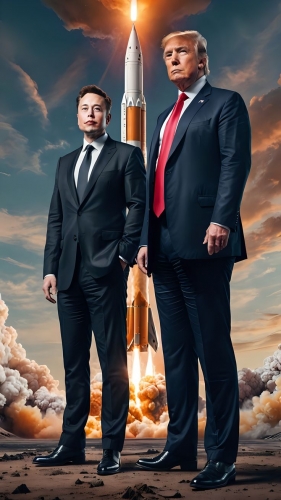
La vitesse de Trump, l'immobilisme de Bruxelles
Giuliano Lengo
Source: https://electomagazine.it/la-velocita-di-trump-limmobilis...
Il y a une centaine de décrets que Donald Trump a signés ou est en train de signer.
Certains d'entre eux sont déjà connus, tous cependant avec un grand impact et une grande discontinuité par rapport à l'ère Biden.
Maintenant, et c'est normal, ce sont les différents commentaires émis sur ces décisions rapides, qui comptent, dont certains avec lesquels nous sommes d'accord sur le timing, les mérites et les motions, mais posons-nous surtout une question.
Serons-nous un jour capables, en Europe, de décider de mesures urgentes susceptibles de contribuer sérieusement aux besoins des citoyens et de contrecarrer un déclin qui se manifeste désormais également dans le domaine industriel ?
Un exemple pour tous serait de revoir immédiatement les règles d'engagement pour la transition écologique..... même après ce qu'a décidé Trump !
A mon avis, l'articulation actuelle du Parlement européen (même avec un double siège et avec des déchets que nous ne pouvons plus nous payer) ne le permettrait pas, je pense, d'ailleurs une seule voix suffit à invalider toute délibération.
Une telle synthèse et action est trop fulgurante pour une bureaucratie aussi empêtrée et bloquée par l'unanimité du vote entre des états qui ont 1000 intérêts différents.
Si les Etats-Unis poursuivent ce qu'ils ont promis et que les autres grandes puissances y répondent, l'Europe, si elle ne change pas ses règles et son rythme, se dirige vers l'extinction politique et économique, en s'évaporant par elle-même !
Il est urgent de revoir en profondeur les concepts qui ont conduit à l'Union européenne, qui a été créée davantage pour élargir la zone de chalandise que pour mettre en place un système fonctionnel.
J'évite, en faisant semblant d'oublier, de m'attarder sur ce que M. Prodi et le gouvernement de l'époque ont fait en bradant notre lire (1936,27 pour 1 euro), ce qui, contrairement à ce qu'il a déclaré à l'époque, a conduit les Italiens à s'appauvrir.
Je me souviens que dans la « Charte », nous avons également renoncé à nos origines chrétiennes.., mais cela en valait-il la peine, même si la réflexion est faite avec le « recul » ?
19:22 Publié dans Actualité, Affaires européennes | Lien permanent | Commentaires (0) | Tags : donald trump, union européenne, affaires européennes, europe |  |
|  del.icio.us |
del.icio.us |  |
|  Digg |
Digg | ![]() Facebook
Facebook
mardi, 04 mars 2025
Le pétage de plomb «spontané» de Zelensky - un drame en trois actes
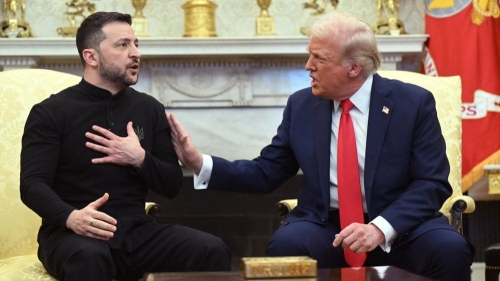
Le pétage de plomb «spontané» de Zelensky - un drame en trois actes
Elena Fritz
Source: https://www.pi-news.net/2025/03/selenskyjs-spontaner-ausr...
Le scandale commis par Zelensky à la Maison Blanche n'était pas un pétage de plombs spontané - c'était la finale d'un plan dont les racines se trouvent à Londres et dont les élites européennes tirent les ficelles.
Vendredi soir, la Maison Blanche est entrée en effervescence - pas littéralement, mais politiquement (PI-NEWS a rapporté les faits, v. https://www.pi-news.net/2025/02/trump-und-jd-vance-schlagen-frechen-selenskyj-in-washington-k-o/ ): Volodymyr Zelensky a quitté Washington prématurément après une dispute fracassante avec Donald Trump. Un coup d'éclat qui a rompu les fils transatlantiques. Mais il ne s'agissait pas d'un pétage de plomb spontané - c'était l'épilogue d'un plan dont les racines se trouvent à Londres et dont les élites européennes tirent les ficelles. L'Allemagne, elle, est au beau milieu de tout cela. Un drame en trois actes.
Acte 1 : l'étincelle britannique en janvier
Revenons à janvier 2025: Keir Starmer visite Kiev, signe un « contrat de partenariat » avec Zelensky (voir: https://www.reuters.com/world/europe/ukraine-uk-sign-100-year-partnership-agreement-2025-01-16/). Ports, gaz, terres rares - tout passe sous contrôle britannique. Une manœuvre qui prend les Etats-Unis au dépourvu. Londres s'assure une large zone d'influence alors que Trump est encore occupé par son investiture. De la spéculation? Bien sûr que oui. Mais le gouvernement britannique a un motif: faire de l'Ukraine un levier contre un Trump imprévisible qui menace l'Europe de se retrouver sous la pluie. Le traité est le signal de départ - et l'Allemagne acquiesce, Scholz et Baerbock se taisent.
Acte 2 : l'Irlande comme fusible
Coupe du 27 février : Zelensky rencontre des représentants britanniques en Irlande (voir: https://www.irishexaminer.com/news/politics/arid-41583055.html), la veille de son départ pour Washington. Une coïncidence? Sans doute pas. Les canaux Telegram ukrainiens le murmurent: Zelensky a reçu ici son ordre de marche. Il s'agit de saboter Trump, de tenir les Etats-Unis à l'écart, de protéger les intérêts britanniques. Pourquoi l'Irlande? C'est un sol neutre, discret - parfait pour la direction de Londres. Les élites européennes - von der Leyen, Baerbock, Macron - sont au courant ou du moins s'en doutent. L'Allemagne se positionne: «L'Ukraine n'est pas seule», affirme Baerbock sur Instagram. Von der Leyen exprime sa solidarité absolue sur X en ukrainien: «Votre dignité honore le courage du peuple ukrainien. Soyez fort, soyez courageux, soyez sans peur. Vous ne serez jamais seul, cher président Zelensky. Nous continuerons à travailler avec vous pour une paix juste et durable» (voir: https://x.com/vonderleyen/status/1895566103222632732). Scholz et Merz approuvent. Un chœur de solidarité - ou une couverture pour le jeu britannique ?
Acte 3: A Washington, ça explose
Fin février, bureau ovale: Zelensky devait signer un accord sur les matières premières avec Trump - au lieu de cela, les apostrophes et les répliques volent. Trump hurle: «Vous risquez la troisième guerre mondiale! Zelensky contre-attaque: «Pas de deals avec des assassins! Le président ukrainien sort en trombe, Trump se déchaîne sur Truth Social: «Il a humilié les Etats-Unis». Un désastre ? Non, un triomphe - pour les élites européennes. Zelensky a placé Trump exactement là où elles le voulaient: provoqué, isolé, affaibli. La Grande-Bretagne se frotte les mains - son influence demeure, les Etats-Unis restent hors du jeu. Et l'Allemagne? Scholz marmonne: «Nous sommes avec l'Ukraine». Merz met en garde: «Ne pas confondre agresseur et victime». Une action concertée qui défie Trump.
Spéculons: Les élites européennes, menées par les Britanniques, utilisent Zelensky comme une arme. Objectif ? Forcer Trump à laisser tomber l'Ukraine ou à réagir durement - les deux positions divisent l'Occident. Londres veut assurer son rôle d'acteur, l'UE veut montrer son unité. Mais le risque est élevé. Trump pourrait répliquer - arrêter les fournitures d'armes, sanctionner l'Europe. Ou bien il négocierait avec Poutine et laisserait l'UE de côté. Les Britanniques misent sur le chaos, l'Allemagne sur la solidarité - c'est une danse sur le fil du rasoir.
Conclusion: qui tient les ficelles?
L'esclandre n'est pas le fruit du hasard, mais d'un scénario britannique mis en scène par Zelensky. Les élites européennes - Allemagne comprise - jouent le jeu pour humilier Trump. Mais qui contrôle qui? Zelensky est-il une marionnette ou un acteur? Une chose est sûre: la scène mondiale tremble et c'est la Grande-Bretagne qui dirige - tandis que l'Allemagne applaudit à tout rompre. Trump va répondre. Le prochain tour commence.
20:32 Publié dans Actualité, Affaires européennes | Lien permanent | Commentaires (0) | Tags : ukraine, volodymir zelenski, donald trump, europe, affaires européennes, politique internationale |  |
|  del.icio.us |
del.icio.us |  |
|  Digg |
Digg | ![]() Facebook
Facebook
lundi, 03 mars 2025
Le nouveau « Nouveau monde » de Trump
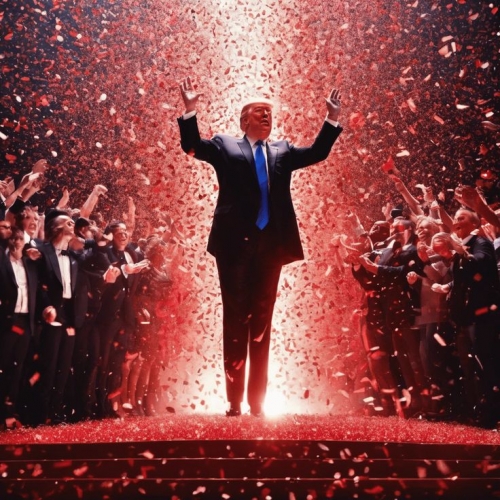
Le nouveau « Nouveau monde » de Trump
Pierre-Emile Blairon
Environ tous les deux ans, je fais éditer un recueil de textes qui réunit tous mes articles parus durant ce laps de temps (sans compter les éventuels ouvrages sur un sujet bien déterminé) ; j’appelle ces recueils des chroniques, bien qu’ils ne soient pas toujours rassemblés chronologiquement, comme l’exigerait la définition de ce type de littérature.
Cette fois, ce recueil comprenait 26 articles rédigés entre le 8 novembre 2023 et le 8 février 2025 en 290 pages. Cet ouvrage devait paraître en mars 2025 et avait reçu pour titre : Haute trahison et, pour sous-titre : Quand les élites rejettent leurs peuples.
Il devait être divisé en deux parties : Satanisation et titanisation du monde et, en seconde partie, Les dirigeants contre leurs peuples.
Il s’est passé entretemps un événement extraordinaire qui a reporté ce projet éditorial à une date ultérieure : l’accession au pouvoir de Donald Trump le 20 janvier 2025, qui a profondément modifié tous les paramètres en cours qui devaient assurer logiquement cette parution.
Changement de paradigme
Il s’est en effet produit en quelques semaines aux USA un changement de paradigme qui a bouleversé toutes les données acquises depuis la fin de la seconde guerre mondiale.
Un changement de paradigme – modification profonde de la façon de penser et d’agir - est souvent associé à une connaissance scientifique qui, vue sous un autre prisme, peut se révéler être de nature purement spirituelle même si les acteurs et spectateurs de ce bouleversement n’ont, en règle générale, pas conscience de son caractère révolutionnaire car les uns et les autres agissent et réagissent en fonction d’une logique qui, en apparence, reste contenue dans des normes ordinaires.

Les primordialistes [1], dont la principale qualité reste la capacité de voir plus haut et plus loin, ont déjà pu analyser, à la lueur des récits traditionnels, ce phénomène de retournement brutal qui s’apparente au renversement d’un glaçon dans un verre « comme pourrait le faire un iceberg qui peut opérer un Grand Retournement, selon le principe même du cycle, Grand Retournement qui se fait instantanément, sans glissement progressif d’un état à l’autre [2] ». Je faisais remarquer, dans cet extrait qui présentait mon recueil d’articles paru en 2021 [3], que « la science profane rejoint quelquefois la science sacrée : les scientifiques appellent ʺretournementʺ ou ʺbasculementʺ un iceberg qui inverse son sommet et sa base. »
Le terme « révolution » convient parfaitement à ce brusque retournement à 180° qui abolit la plupart des certitudes sur lesquelles s’était fondée la croyance en un certain type de société qui s’est avérée n’être qu’une illusion, en l’occurrence dévastatrice.
Ce qui a abasourdi les observateurs, c’est la rapidité et la facilité avec lesquelles cette Révolution s’est produite, comme si c’était un jeu d’enfant, comme s’il suffisait de décréter la mise en place d’une nouvelle base de valeurs pour la voir se réaliser sous nos yeux, simplement en brandissant une baguette magique.
Nous avons en effet peine à imaginer l’énorme charivari – sans doute non encore bien maîtrisé - que ce Grand Retournement représente d’organisation et de décisions au niveau de la plus grande puissance du monde, même si cette dernière en était à vivre des moments difficiles au moment où le basculement paradigmatique s’est produit et à effectuer des concessions douloureuses au nom de l’avènement d’un monde multipolaire qui étend inexorablement ses tentacules sur l’ensemble de la planète. Et c’est peut-être parce que l’Amérique était acculée, contrainte à cet effort de changement, que la magie a pu opérer.

On ne peut s’empêcher d’établir le parallèle entre ces événements et la chute du Mur de Berlin le 9 novembre 1989 qui symbolisait la fin du communisme en URSS et, par contrecoup, l’occidentalisation hasardeuse et maléfique du monde avec la disparition des repères traditionnels qui fondaient les antiques civilisations.
Il n’est pas anodin de préciser, pour rappeler ce que je disais plus haut, que ce moment historique qui a marqué la fin du XXe siècle – la chute du mur de Berlin - a été judicieusement appelé « Le tournant ».
Eh bien, nous pouvons constater que le monde procède naturellement d’une manière cyclique par tournants et retournements, que le chemin heureux d’un progrès lisse et sans fin n’existe pas, qu’il suffit parfois de quelques pitreries bien calculées d’un Donald ou d’un Elon pour renverser la table que certains pensaient taillée dans le granit rose le plus solide et ancrée dans les délires du wokisme le plus effréné.
Covid 19 : l’horreur programmée
Soyons clairs au risque de choquer la raison de bien de gens naïfs et trop frêles pour admettre ce qui dépasse l’entendement : la secte pédo-sataniste qui a pris le pouvoir sur le monde à l’orée de 2020 préparait son coup depuis des siècles, si ce n’est des millénaires.
Cette secte est le produit de la décomposition de forces épuisées, « entités maléfiques qui appartiennent au cycle noir qui s’achève et seront emportées avec lui en phase ultime, comme une écume qui s’envole au vent, ʺcomme volatiliséesʺ, a dit Guénon, car elles ne sont que les résidus de mondes disparus, sans lien profond avec le monde et la vie, même si elles se présentent sous les oripeaux rutilants de la plus extrême modernité, la « modernité » étant l’un des aspects majeurs de la décadence [4]. »
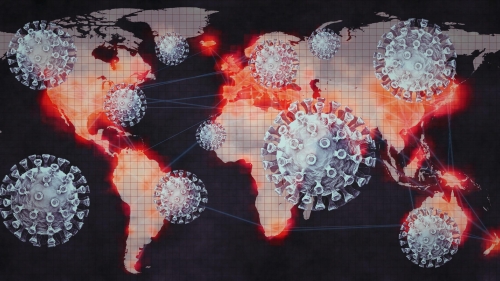
Le 21 décembre 2020, dans un article intitulé Le monde, un malade en phase terminale [5], j’écrivais ceci qui devrait plaire à Donald Trump qui ne manquera certainement pas de lire cet article : « les derniers soubresauts de ce monde agonisant ne s’achèveront que dans l’horreur et la terreur à moins d’un retournement de la situation politique aux Etats-Unis qui verrait le président Trump reprendre ses fonctions. Cela pourrait alors signifier au moins une halte dans le processus de décomposition. »
Je me suis trompé, Trump, en ces derniers jours de février 2025, est allé beaucoup plus loin que ce que nous n’aurions pu l’espérer en 2020.
Il faut dire que les perspectives d’alors n’étaient guère réjouissantes car les plus lucides d’entre nous commençaient à entrevoir l’ampleur de la manipulation puisque j’écrivais en aout 2020 un article titré : Objectif Covid : soumission et robotisation de la population planétaire [6].
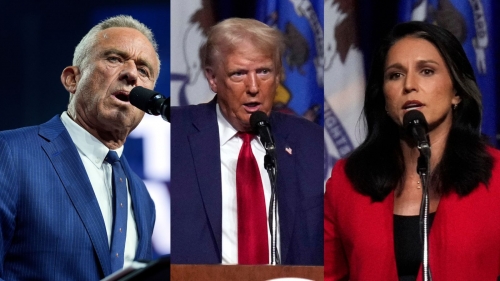
Donald Trump, Elon Musk, J. D. Vance, Robert Kennedy jr, Tulsi Gabbard et l’équipe admirable qu’ils ont mise en place ont pu heureusement faire échouer ce sinistre projet.
Comment expliquer la réussite totale de l’épisode pédo-sataniste (2020-2024) avant son interruption décisive ordonnée par l’administration Trump ?
J’ai indiqué dans nombre de mes articles précédents la probable genèse de ce culte à Satan qui trouverait, paradoxalement, ses origines dans les trois religions du Livre et qui a fait florès, par dévoiement ou réaction, au sein de la société américaine et de ses élites depuis l’arrivée des premiers pionniers anglo-saxons, les « pilgrims », rejetés d’Angleterre justement à cause de leur fanatisme biblique axé essentiellement sur l’étude de l’Ancien testament, ce qui explique l’identification de certaines sectes américaines actuelles aux coutumes religieuses du peuple juif.
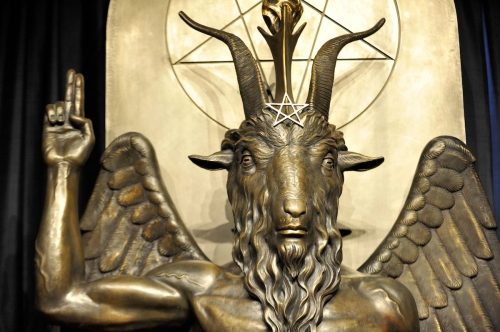
C’est au nom du retour à une normalité religieuse que Trump et Musk se sont attaqués au satanisme et sont prêts à le faire entièrement disparaître, englouti, en même temps que toute la clique du satano-showbiz, dans les miasmes nauséabonds des derniers relents de l’affaire Epstein.
Comme il semble qu’ils vont réussir à arrêter cette guerre déclarée à la Russie par l’Otan sous faux drapeau ukrainien et à écarter définitivement de la scène politique ce voyou cocaïnomane qu’est Zelinsky et toute la bande des mondialistes décadents qui le soutiennent en Europe (de Bruxelles).
Comme ils vont, nous le souhaitons vivement, mettre sous les barreaux - voire plus si besoin est - les responsables de cette fausse pandémie et de ces faux vaccins qui ont tué, et qui vont encore tuer des millions de personnes sur la planète.
Nous avons beaucoup souffert en France des méfaits du wokisme et du gauchisme, de la propagation, avec l’assentiment de l’Education nationale, des théories du genre, notamment dans les petites classes de nos écoles transformées en laboratoires d’initiation aux pratiques sexuelles ; nous avons beaucoup souffert en France, de la satanisation des spectacles proposés aux foules lobotomisées ; aucun d’entre nous n’oubliera la honte qui s’est abattue sur les Français quand ils ont découvert - la même année !- les spectacles répugnants des Jeux Olympiques [7], de l’Eurovision, de Toulouse [8]. Mais qui ne sont pas plus abjects que les folies LGBT que le deep state a alimentées en permanence aux Etats-Unis avec l’aide d’une classe politique dépravée (Biden, Clinton, Obama…)
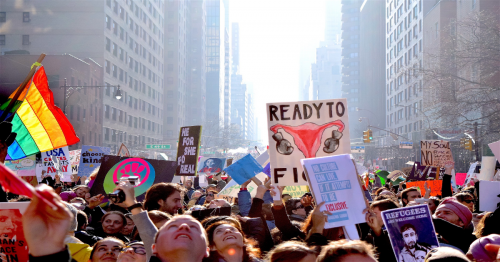
Nous continuerons à souffrir de l’invasion migratoire et nous continuerons à voir nos enfants tués « pour un regard » malgré les appels à la raison d’un Vance ou d’un Trump pour stopper cette folie.
Malheureusement, toutes ces dispositions salvatrices et tous ces vœux pieux ne concernent que les Etats-Unis. Ni Trump, ni Vance, ni Musk, ni aucun américain n’a l’intention de sauver le soldat Macron, et ils ont bien raison ; personne n’interviendra en faveur de cette Europe à la dérive que les Européens n’ont pas voulue, que l’on songe aux magouilles de « l’Américain » Sarkozy après le non au référendum sur l’Europe en 2005 [9].
L’Europe décadente de Bruxelles n’intéresse plus les Américains
L’ancien dissident soviétique, Vladimir Boukovsky, avait écrit en 2005 un livre décapant, L’Union européenne, une nouvelle URSS (éditions du Rocher) qu’il avait résumé dans un discours prononcé à Bruxelles en février 2006. « Il va y avoir un effondrement de l’Union européenne tout comme l’Union soviétique s’est effondrée. Mais n’oubliez pas que, quand ces choses s’effondrent, elles laissent entrer une telle dévastation qu’il faut une génération pour s’en remettre. Pensez seulement à ce qui se passera s’il arrive une crise économique. Les récriminations entre nations seront immenses. Ça pourrait mener à une explosion. Regardez l’immense nombre d’immigrants du tiers-monde vivant maintenant en Europe […] C’est pourquoi, et je suis très franc là-dessus, plus tôt nous en finirons avec l’UE, mieux cela vaudra. Plus tôt elle s’effondrera, moins il y aura de dégâts pour nous et pour les autres pays. Mais nous devons faire vite parce que les eurocrates agissent très rapidement. Il sera difficile de les vaincre. »
20 ans bientôt et ce discours n’a pas pris une ride !
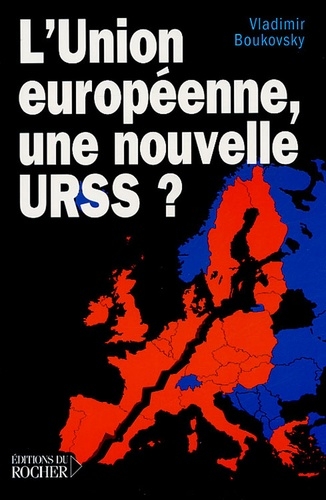
Comme je l’ai évoqué, la secte pédo-sataniste, par ses attaches bien fragiles qui la relient au monde des paillettes – celui du « showbiz » - mais aussi, et surtout, au monde des ténèbres, la composition de ses éléments comparables à des filaments éphémères comme les fils des ampoules électriques, ne peut avoir prise que sur une société artificielle et superficielle. C’est justement ce monde que les globalistes ont tenté de créer, laborieusement, pièce à pièce, depuis des lustres, avant qu’il ne s’effondre d’une chiquenaude comme cela vient d’être fait par ces deux esprits facétieux que sont Elon Musk et Donald Trump.
Cet effondrement se fait autour d’un pôle inattendu : l’Union européenne, création elle aussi artificielle, qui n’a aucune légitimité sur aucun plan, et surtout pas sur le plan démocratique.
L’Union européenne, à l’heure même où j’écris, est en train de constituer la base arrière de toute la sphère woke mondialiste, un camp retranché qui sera régi par des lois liberticides, une dictature d’opérette gérée par des bouffons qui se donneront l’illusion d’exister dans leur monde peuplé de forcenés et de zombies, des va-t-en guerre grotesques armés, comme chez Guignol, d’épées de bois, déchets pathétiques et obsolètes dont la survie est d’ores et déjà comptée.
Avant le séisme Trump, tous ces gens qui se ridiculisent maintenant dans une fuite en avant belliciste sur un champ de bataille ukrainien qui n’existe plus, fuite en avant qui s’apparente à un suicide collectif, avaient un statut éminemment privilégié puisqu’ils étaient censés devenir l’élite du pays (la France).

La seule condition requise était de prêter allégeance à l’Etat profond américain, je veux parler des « Young leaders », ces étudiants inscrits à cette école de formation franco-américaine « de haut niveau », pour la plupart diplômés de l’Ecole Nationale d’Administration, auxquels l’administration américaine, le deep state, demandait seulement de se conformer à ses directives.
Ces jeunes gens donnaient même l’illusion d’avoir un solide bagage intellectuel avant qu’on ne se rende compte que la plupart étaient de fieffés abrutis, leurs formateurs ne leur ayant jamais demandé d’être intelligents, mais d’être soumis [10].
Nous pouvons même nous poser la question de savoir si certaines de ces créatures n’ont pas été entièrement, voire artificiellement, fabriquées par la CIA, comme pourrait l’être un Macron ; nous avons bien remarqué que cet individu se comportait quelquefois comme Biden qui serrait la main de quelqu’un qui n’existait pas, ou qui continuait à passer des troupes en revue alors que ses comparses étaient déjà en train de boire le champagne ; un ravi de la crèche comme on dit en Provence avec bonhomie, ce qui peut amuser Trump.
Une caste de marchands
Je l’ai dit, Trump et son administration feront ce qu’il faut dans l’intérêt exclusif des Etats-Unis ; les marchands comme Trump ne se préoccupent ni de morale ni de culture. Les premières mesures de l’administration Trump adoptées, avec la brutalité qui sied au Nouveau monde, à l’encontre des pays européens – taxation à 25% de leurs produits - ne laissent aucun doute sur ses intentions.
Sans rien préjuger de ce qui sera éventuellement corrigé, il convient cependant de constater que Trump s’inscrit, avec cette mesure peu compatible avec une quelconque volonté d’apaisement, dans la filiation de ceux qui ont fait en sorte que l’Europe devienne, puis reste, un satellite vassalisé des Etats-Unis et cette filiation remonte à la première guerre mondiale qui a vu la paysannerie française décapitée avec 50% des pertes militaires.
Pour évaluer cette catastrophe, il suffit de laisser parler les chiffres. Les sources et les commentaires proviennent des services gouvernementaux français [11].

Pour un conflit qui a fait 9 millions de morts dont 1,4 million pour la France, voici les pertes humaines (rapportées au nombre d’hommes actifs) ; c’est moi qui ai souligné en gras certaines données.
- France : 10,5%
- Allemagne : 9,8%
- Autriche-Hongrie : 9,5%
- Italie : 6,2%
- Royaume-Uni : 5,1%
- Russie : 5%
- Belgique : 1,9%
- États-Unis : 0,2%
« L’appauvrissement du Royaume-Uni, de la France et de l’Allemagne fut compensé par l’enrichissement des pays qui avaient profité de la guerre, le Japon et surtout les États-Unis. Ces derniers ont largement renforcé leur place de première puissance économique et sont devenus la première puissance financière : débiteurs de l’Europe avant la guerre, ils en étaient maintenant les créanciers. »


Pour ce qui est de la seconde guerre mondiale, je dois juste rappeler que Hitler n’a pu accéder au pouvoir que grâce à l’appui de certaines banques et entreprises américaines telles que Morgan, Chase Manhattan (Rockfeller), Ford, General Motors, Standard Oil, etc. et que « cette Amérique sera tout aussi présente après la guerre pour créer un organisme à sa botte qui s’appellera l’Union Européenne. L’un des fondateurs de cette structure sera Jean Monnet, agent de la CIA (selon Marie-France Garaud, Philippe de Villiers, François Asselineau et bien d’autres), tandis que d’autres fondateurs de cette institution comme Robert Schuman et le belge Paul-Henri Spaak (ancien secrétaire général de l’Otan) tiendront le rôle de simples exécutants au service des États-Unis [12] ».
Je passe sur les innombrables conflits fomentés par la CIA et mis en œuvre par son bras armé, l’Otan, qui ont semé la terreur, la haine, la misère et la mort sur la planète pendant des dizaines d’années juste pour entretenir « le commerce », à savoir le complexe militaro-industriel des Etats-Unis.
Nous pouvons espérer que, grâce aux nouvelles bonnes intentions américaines, ce chaos orchestré fait désormais partie du passé.
L’Europe des peuples n’est pas l’Europe de Bruxelles
Cependant, en prenant des mesures contre l’Europe de Bruxelles, l’Amérique de Trump s’en prend aux peuples européens qui n’ont, eux, aucune affinité avec ce monstre administratif, idéologique et dictatorial qui a pris le pouvoir chez eux ; lequel monstre, nous l’avons vu, a été créé par l’Amérique ; les vrais Européens ne demandent qu’à vivre de leur labeur dans un monde apaisé et juste et selon leurs anciennes coutumes. Ce ne sont pas les Européens qui ont programmé l’invasion migratoire dont ils sont victimes. Ce ne sont pas les Européens qui ont demandé à recevoir de faux vaccins au nom d’une fausse pandémie aux débuts des années 2020 ; ils n’ont pas non plus demandé à être conditionnés, voire, pour certains, lobotomisés, par l’ingénierie sociale qui a régné sur tous les actes de la vie sociale sur la quasi-totalité de la planète ; le peuple américain, tout autant que les autres peuples, en a aussi été victime. Mais les Européens ne vont pas accuser les Américains de les avoir placés sous le joug des satano-globalistes, même si la majorité de ces crapules a sévi – et continue à sévir – principalement aux Etats-Unis. De la même façon, les Européens de souche n’ont pas à être accusés de maux dont ils ont été les victimes.

L’Europe des Indo-Européens existe depuis des dizaines de milliers d’années ; plus précisément, selon nos traditions ancestrales, 64.800 ans ; il faut que les Américains comprennent que les Européens conservent encore, pour certains d’entre eux, cet atavisme des origines et la mémoire des temps glorieux que leurs ancêtres ont vécus. On dira que, de ce point de vue, les Indo-Européens sont des peuples natifs, tout comme les Amérindiens.
En vérité, il est quasiment impossible que les habitants de ce que l’on appelle le « Nouveau monde » d’une part, et, d’autre part, ceux, de moins en moins nombreux, dont la longue filiation indo-européenne est encore vivace, ceux qu’on qualifie d’habitants de la « vieille Europe », puissent se comprendre.
Ne serait-ce que parce que les concepts liés à cette définition même de « Nouveau monde » et « d’Ancien monde » sont totalement inversés. Le monde de notre fin de cycle est pris dans le tourbillon de la « Modernité », c’est-à-dire dans une vision progressiste et enchanteresse de l’Humanité qui se trouve aux antipodes de la réalité puisque nous constatons que tout ce qui est d’essence naturelle est au contraire régi par les lois de l’involution qui font que ce qui était juvénile, beau et plein de vitalité, est appelé à se flétrir et à disparaître pour renaître à la nouvelle saison, dans une nouvelle jeunesse, selon le principe cyclique.
Pour le monde de la Tradition, le progrès linéaire d’un univers qui ne cesse de s’améliorer n’existe pas, le principe de l’évolution darwiniste est une illusion bien pratique qui ne vise qu’à remplacer le monde des croyances et des religions à bout de souffle en Occident par celui de la science et de la technoscience, qui est une autre illusion née de la révolution industrielle de la fin du 19e siècle.
Toute manifestation d’ordre physique peut être abolie en un clin d’œil, et toute civilisation qui se fonde sur une conception matérialiste et/ou rationaliste de la vie est appelée à disparaître très rapidement ; ce qui veut dire, à l’échelle d’une civilisation, quelques centaines d’années.
Comprenons bien qu’une arrogance basée sur ce principe de domination est grotesque.
La sagesse d’un peuple se façonne et acquiert quelques éléments de stabilité au bout d’un apprentissage de plusieurs siècles, voire de plusieurs millénaires.

Dans l’Arc et la Massue [13], Julius Evola écrivait qu’il est une bêtise que « l’on entend souvent répéter, à savoir que les Américains seraient une ʺrace jeuneʺ, avec pour corollaire tacite que c’est à eux qu’appartient l’avenir. Car un regard myope peut confondre les traits d’une jeunesse effective avec ceux d’un infantilisme régressif. Du reste, il suffit de reprendre la conception traditionnelle pour que la perspective soit renversée. En dépit des apparences, les peuples récemment formés doivent être considérés comme les peuples les plus vieux et, éventuellement comme des peuples crépusculaires, parce qu’ils sont venus en dernier justement, parce qu’ils sont encore plus éloignés des origines. »
La Tradition primordiale peut se concevoir, en effet, comme la source d’un savoir qui coule sans interruption ; plus une civilisation est éloignée de la source originelle, et moins elle a de chances de s’y abreuver et de s’ancrer dans le monde spirituel parce qu’elle aura perdu les connaissances qui lui auraient permis de se raccrocher aux principes d’origine.
« Les civilisations traditionnelles donnent le vertige par leur stabilité, leur identité, leur fermeté intangible et immuable au milieu du courant du temps et de l’histoire. », rajoute Evola.
Quelle nouvelle Amérique pour quel Nouveau monde ?
Il serait facile de répondre : Nihil sub sole, il n’y a rien de nouveau sous le soleil ; les Américains feront ce qu’ils savent faire déjà. Le problème, c’est que ce qu’ils savent faire, c’est la guerre par procuration, ou sous faux drapeau, si l’on préfère.
Mais nous avons cru comprendre que les Américains allaient désormais suivre une voie vertueuse, se donner des règles de morale et, peut-être, de cohabitation heureuse avec ses voisins dans un monde multipolaire où personne ne tirera à soi la couverture. Vous pouvez y croire si vous croyez au Père Noël. Comme je l’ai dit, je pense plutôt que Trump et sa nouvelle administration ont évalué les changements intervenus ces dernières années dans les rapports de forces internationaux et en ont conclu qu’il était urgent de changer son fusil d’épaule et même de le mettre au râtelier le temps de s’organiser, même si les rodomontades de Trump peuvent faire croire temporairement à une agressivité débridée.
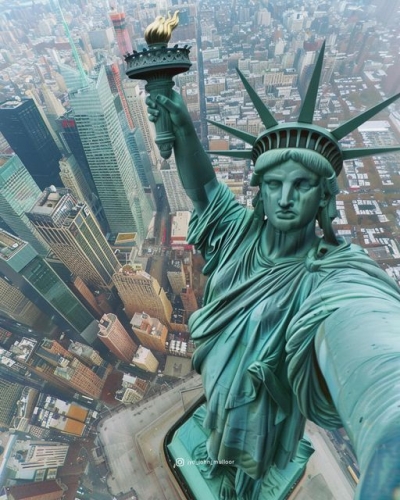

La civilisation américaine est une civilisation moderne, donc éloignée de la source régénérative, elle est fragile, un colosse aux pieds d’argile dont les représentants patentés tentent de se constituer une apparence de dur à cuire, de bagarreur balafré qui n’hésite jamais à brandir son colt pour affirmer sa virilité. Ils évoluent dans un décor hollywoodien tout en bois, une façade de saloons, d’enseignes de coiffeurs et de croque-morts, où déambulent de faux chercheurs d’or, de faux Indiens et de vrais escrocs.
Le transhumanisme, avatar du prométhéisme, s’inscrit dans ce décor de cinéma, professant le culte de l’apparence et de l’éternité (ou de l’apparence éternelle) au même titre que ce que les modernistes évolutionnistes appellent l’Intelligence Artificielle. L’idée des transhumanistes, c’est de remplacer Dieu ; ils n’ont envisagé aucune autre perspective que celle de la mort de la mort ; comme ils ne croient en rien, ils espèrent que la technoscience va leur permettre de devenir éternels. Cela suppose cependant qu’ils devront se débarrasser de plusieurs milliards d’individus qui n’auront pas accès à l’immortalité puisque les transhumanistes l’auront interdite (pour les autres).

Quant à l’Intelligence Artificielle, c’est la croyance aveugle au progrès technologique et en la supériorité de la technoscience qui va permettre à l’Homme d’être déchargé de ses tâches par le robot. Ou, du moins, c’est ce que croient les naïfs car il est clair comme l’eau de roche que le scénario le plus probable sera le même que pour celui du transhumanisme : l’humain sera transformé en robot, sauf une petite élite qui aura réussi à préserver son pré carré.
Bon, je plaisantais : je viens de vous donner-là deux scenarii imaginés par des technocrates qui sont, comme chacun sait, de parfaits crétins.
Voici ce que je pense : C'est d'une grande folie (ou d'une consternante stupidité) de penser que les lois de la nature pourraient être abolies par une "intelligence artificielle". La nature reprend toujours ses droits.
L’I.A. ne pourra jamais remplacer cette petite flamme qui brille en chaque être humain depuis la nuit des temps et qui le relie, comme un héritage précieux et permanent, aux origines de la vie, aux origines de l’Homme, aux origines du monde, mais aussi aux origines de lui-même, cette petite flamme transmise, concrètement et symboliquement, de génération en génération pendant plus d’un millier d’années par les vestales romaines.
Pierre-Emile Blairon
Notes:
[1] Les primordialistes sont les représentants actuels de la Tradition primordiale, concept d’ordre spirituel qui tire ses connaissances des traditions des anciens peuples indo-européens Grecs, Indous, Iraniens, Celtes, Latins, Germains, Slaves, Nordiques … La signification de l’expression Tradition primordiale a été largement expliquée par René Guénon et Julius Evola qui considèrent qu’il s’agit d’un principe originel permanent et immuable qui a fondé toutes les traditions et civilisations du monde sur toute la surface de la Terre, auxquelles ces dernières se réfèrent et en sont une émanation. Les religions, qui constituent actuellement a minima une stabilisation - cohérente et si possible harmonieuse - des mœurs d’une civilisation, un garde-fou, sont elles-mêmes subordonnées à la Tradition primordiale puisqu’il existe des primordialistes chrétiens, païens, spiritualistes, indouistes… Ces traditions originelles savent que le temps est cyclique, à l’image de la nature, que ce temps est divisé en quatre Âges, qui se dégradent suivant une involution du meilleur au pire, de la spiritualité à la matérialité, de l’Âge d’or à l’Âge de fer (le Kali-Yuga) avant qu’un retournement n’intervienne et qu’un nouveau cycle se mette en place. Nous sommes placés à la fin de la phase finale du dernier âge, comme l’extrême décadence en cours nous l’indique.

[2] L’Iceberg, la Tradition primordiale contre le titanisme, Editions du Lore, 2021.
[3] Ibid.
[4] ibid
[5] https://nice-provence.info/2020/12/21/monde-planete-malade-phase-terminale/
[6] http://euro-synergies.hautetfort.com/archive/2020/08/01/objectif-covid-soumission-et-robotisation-de-la-population-planetaire.html
[7] https://nice-provence.info/2024/08/02/jo-paris-2024-frankenstein-echappe/
[8] https://nice-provence.info/2024/10/29/porte-tenebres-grand-ouverte-toulouse/
[9] http://euro-synergies.hautetfort.com/archive/2025/01/18/sarkozy-l-americain-6531523.html
[10] http://euro-synergies.hautetfort.com/archive/2025/01/30/l-extreme-droite-en-europe-tout-va-changer-pour-que-rien-ne-change.html
[11] https://www.vie-publique.fr/eclairage/19334-premiere-guerre-mondiale-1914-1918-un-lourd-bilan
[12] https://nice-provence.info/2023/03/04/ukraine-berceau-tombeau-europeens/
[13] Julius Evola, L’Arc et la massue, éditions Trédaniel-Pardès
17:32 Publié dans Actualité | Lien permanent | Commentaires (0) | Tags : actualité, donald trump, pierre-émile blairon, tradition |  |
|  del.icio.us |
del.icio.us |  |
|  Digg |
Digg | ![]() Facebook
Facebook
Le jeu des devinettes sur les véritables objectifs de Trump en Ukraine
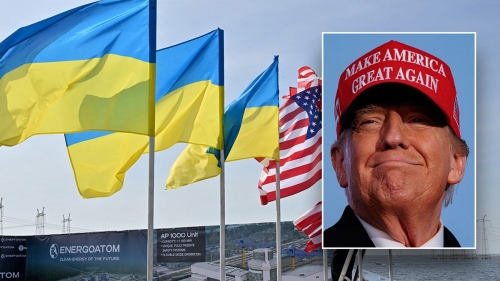
Le jeu des devinettes sur les véritables objectifs de Trump en Ukraine
Source: https://dissident.one/het-gokspel-over-trumps-werkelijke-...
Le jeu de devinettes sur la position réelle du président Donald Trump sur la paix en Ukraine se poursuit.
Certains commentateurs, dont je fais partie, pensent que Trump a commis une erreur en s'engageant trop fortement en faveur de l'Ukraine, écrit l'un des collaborateurs du site Moon of Alabama. D'autres pensent que Trump trompe le public tout en travaillant pour la paix dans les coulisses.
Les deux derniers articles du blog font partie de ce jeu de devinettes :
- Trump a-t-il vraiment un plan pour l'Ukraine ? (https://www.moonofalabama.org/2025/02/does-trump-really-h...)
- Ukraine - Accord minéral, Lavrov rejette les soldats de la paix, la guerre est destinée à devenir le Vietnam de Trump (https://www.moonofalabama.org/2025/02/ukraine-minerals-de... )
Pour résumer le premier article :
Aucune des approches que l'on pourrait penser que Trump adopte - utiliser un accord sur les ressources de l'Ukraine pour maintenir les États-Unis en Ukraine et poursuivre la guerre, ou utiliser l'accord sur les ressources de l'Ukraine pour finalement rompre avec l'Ukraine - n'est compatible avec une évaluation réaliste des faits sur le terrain. En tout cas, pas si le but du jeu est de faire la paix.
...
La conclusion pour moi est qu'il n'y a aucun plan de Trump pour faire la paix en Ukraine.
et la seconde option est :
En insistant sur l'accord, au lieu d'accepter l'offre russe d'accès aux minerais, Trump s'est engagé à poursuivre la guerre en Ukraine.
...
Cela conduira à l'échec de son initiative de paix.
La guerre en Ukraine menace maintenant de devenir le Vietnam de Trump.
Yves Smith, l'animatrice du site Naked Capitalism, soutient mon dernier point de vue. Elle cite une conversation récente entre le juge Napolitano et le colonel Douglas MacGregor et écrit :
"Cette section confirme ce dont j'avais averti, mais un grand nombre de commentateurs semblent ne pas vouloir l'accepter: l'accord sur les minerais en Ukraine, s'il est conclu, obligera les États-Unis à s'engager auprès de l'Ukraine et donc à la soutenir".
En d'autres termes, cet accord n'a aucun mérite et mettrait Trump dans l'embarras si les négociations de paix échouaient (ou, mieux encore, ne commençaient même pas).
Au cours de cette section, Napolitano a présenté une citation de Trump:
Trump: "Le président Zelensky vient signer l'accord, et c'est formidable. C'est aussi une bonne chose pour l'Ukraine, parce que lorsque nous irons là-bas, nous travaillerons sur place, nous serons sur le terrain, et de cette façon, il y aura une sorte de sécurité automatique, parce que personne ne s'en prendra à notre peuple pendant que nous sommes là-bas. C'est ainsi que nous serons présents. Mais l'Europe suivra cela de très près. Je sais que le Royaume-Uni et la France ont dit qu'ils voulaient envoyer des « soldats de la paix » sur le terrain. Et je pense que c'est une bonne chose".
Napolitano et Macgregor ne sont pas d'accord avec la position de Trump:
Napolitano: Vous savez, nous le respectons tous les deux et nous applaudissons sa volonté de parler aux Russes. Mais des déclarations comme celle-ci trahissent soit une ignorance crasse, soit de très très mauvais renseignements. Qu'en pensez-vous, Colonel...
Macgregor: Non, je pense que c'est une façon polie de le dire. Pour être honnête, le président Trump devrait abandonner l'idée d'envoyer en Ukraine quiconque n'est pas ukrainien. Et s'en tenir éloigné. J'ai entendu cela et j'ai été sincèrement déçu parce qu'il y a eu un grossier contresens. ...
D'autres, cependant, rejettent l'interprétation pessimiste.
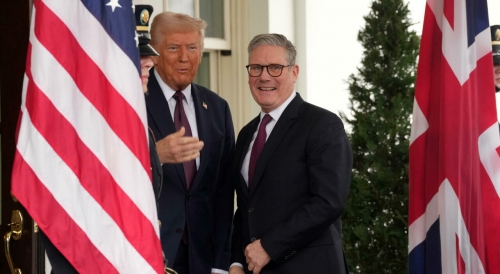
Gilbert Doctorow commente la conférence de presse de Trump avec le Premier ministre britannique Starmer:
"Même certains des commentateurs les plus avisés et les plus avisés des proches de Trump dans les médias alternatifs le sous-estiment et continuent de le considérer comme un bouffon dont les incohérences et les contradictions dans ses déclarations publiques sont, du jour au lendemain, la preuve irréfutable qu'il ne peut pas mener une initiative à son terme. C'est exactement ce que j'ai vu et entendu plus tôt dans la journée en écoutant l'interview par « Judging Freedom » du colonel Larry Wilkerson, que, soit dit en passant, je respecte énormément pour ses observations sur les relations des États-Unis avec Israël ou sur la situation du champ de bataille dans la guerre russo-ukrainienne".
...
"Non, ce Trump est un maître de la tromperie. La conférence de presse d'aujourd'hui avec Keith Starmer a été la preuve positive que l'idée vague et non spécifique selon laquelle l'Amérique soutient les soldats de la paix européens en Ukraine est strictement une tactique pour faire taire les Européens pendant que Washington conçoit une solution finale mutuellement acceptable avec Moscou qui l'imposera à l'Ukraine et à l'Europe au bon moment".
Commentaires de Wilkerson (@4min) cités par Doctorow:
Napolitano: Est-ce que [Trump] ne comprend pas la mentalité de Vladimir Poutine?
Wilkerson: Apparemment, non. En fait, ce sont des commentaires très imprudents parce qu'il compromet sa propre capacité à négocier un accord décent. C'est tout simplement absurde et ça le devient de plus en plus s'il continue à parler comme ça. C'est mon problème avec Donald Trump: il résout un problème, du moins pour l'instant, puis il passe à autre chose et ruine le problème qu'il a lui-même résolu avec ses coups de gueule.
Je ne sais pas comment on peut faire de la diplomatie de cette manière".
Le professeur John Mearsheimer n'y croit pas (@14min):
Je pense que lorsqu'on regarde le gouvernement et ce qui se passe en termes de politique étrangère, il faut faire la distinction entre ce qui se passe derrière des portes closes, le processus de décision réel, et ce qui se passe en public.
Commençons par ce qui se passe derrière les portes closes:
Donald Trump et tous les membres de son administration savent très bien quelles sont les exigences russes, et le fait que Trump ait dit et que d'autres aient dit qu'un accord pouvait être trouvé signifie que nous savons quelles sont ces exigences et que nous allons les satisfaire, point final. Et cela inclut cette idée folle d'envoyer des soldats de la paix, d'accorder des garanties de sécurité, etc. Poutine a clairement fait savoir que c'était inacceptable et Trump l'a accepté de facto. Il s'agit là d'une conversation privée qui s'est déroulée à huis clos.
Ensuite, il y a le débat public et le débat public est une sorte de débat sauvage et fou, en grande partie parce que Trump est libre de dire ce qu'il veut et parce qu'il aime pontifier quotidiennement, qu'il ne prête pas beaucoup d'attention aux faits et qu'il n'est pas très prudent avec son langage. Nous nous retrouvons dans tous ces débats sur ce qu'il veut vraiment dire, sur le fait qu'il se contredit, etc.
J'en suis arrivé à un point où je ne fais plus attention à ce qu'il dit en public. La question est de savoir ce qu'ils disent en privé et je crois qu'ils savent en privé ce qu'il faut dire. Ils l'ont déjà dit aux Russes au moins une fois et il reste maintenant à régler les détails.
J'espère que Doctorow et Mearsheimer ont davantage raison qu'Yves Smith, moi-même, Macgregor et Wilkerson. Le jeu public que nous voyons et entendons n'est qu'une façade qui cache une politique sérieuse.
Cependant, comme Wilkerson, je crains que trop de discours publics, même s'ils ne sont pas sérieux, ne deviennent réalité à leur manière.
Mais le côté positif, c'est que nous pouvons voir Trump régler les questions (européennes) correctement.
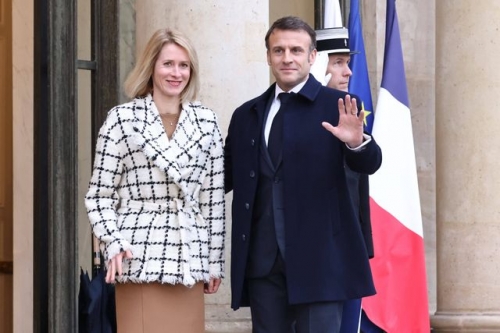
Le président français Macron et le premier ministre britannique Starmer n'ont pas réussi à obtenir le soutien des États-Unis à l'envoi de troupes européennes en Ukraine. La Haute représentante de l'Union européenne pour les affaires étrangères, Kaja Kallas, belliqueuse et incompétente, est venue à Washington pour être congédiée sur-le-champ. Sa rencontre avec le ministre des affaires étrangères Marco Rubio a échoué en raison de « problèmes de calendrier » (la rumeur veut que Kallas ait crié « apaisement » au ministre de la défense Hegseth lors de la récente conférence de Munich sur la sécurité).
La prédiction du président Poutine selon laquelle les Européens finiront par « se coucher aux pieds de Trump en remuant la queue » s'est réalisée:
« Trump, compte tenu de sa personnalité et de sa fermeté, rétablira l'ordre assez rapidement. Et tous, bientôt, vous le verrez, se coucheront aux pieds du maître, la queue frétillante », a-t-il déclaré dans un entretien avec Pavel Zarubin, journaliste de VGTRK.
Les Russes se joignent donc aux plans de Trump.
L'obstacle le plus difficile à franchir pour la paix en Ukraine est le président Zelenski. C'est lui qui a le plus à perdre des négociations de paix sur l'Ukraine. Plus tard dans la journée, Trump lui fera signer l'« accord sur les minerais », qui n'a aucune valeur. Mais cela suffira-t-il à le maintenir dans le droit chemin ?
Et quelles sont les prochaines étapes que Trump souhaite franchir ? La Russie ne permettra pas un cessez-le-feu selon les lignes actuelles, mais veut le grand paquet stratégique - une structure de sécurité indivisible en Europe - en une seule fois.
Trump a-t-il vraiment la volonté et les capacités nécessaires pour que cela se produise ?
12:54 Publié dans Actualité | Lien permanent | Commentaires (0) | Tags : actualité, politique internationale, europe, affaires européennes, donald trump, ukraine |  |
|  del.icio.us |
del.icio.us |  |
|  Digg |
Digg | ![]() Facebook
Facebook
mercredi, 26 février 2025
Quels sont les plans de Trump pour la bande de Gaza ?
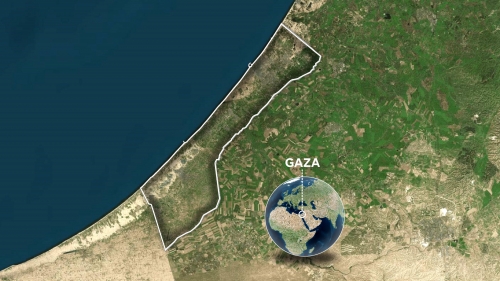
Quels sont les plans de Trump pour la bande de Gaza ?
Damir Nazarov
Juste après la signature d'un accord de cessez-le-feu dans la bande de Gaza, le nouveau président des États-Unis a indirectement laissé entendre ses plans concernant une partie de la Palestine.
Quelques jours après avoir émis ses réflexions sur l'avenir de la bande de Gaza, Trump a commencé à fantasmer sur le thème du transfert des Palestiniens en Égypte et en Jordanie, déclenchant instantanément une réaction négative de la part des régimes des pays arabes mentionnés. Étant donné les énormes investissements du lobby sioniste dans la campagne présidentielle de Trump, il est évident que, tout comme lors de son premier mandat, le leader de M.A.G.A. sera contraint de soutenir tous les plans extrémistes d'occupation sioniste. L'expansion d' "Israël" aux dépens de la Syrie, de la Cisjordanie et même de la Jordanie a officiellement pour objectif une soi-disant "stratégie de lutte contre les défis extérieurs". De plus, les "Israéliens" ne semblent pas être troublés par lanature allié de l'autocratie hachémite, l'activité intense des collaborateurs de "l'Autorité palestinienne" pour réprimer la résistance et le désir des jihadistes syriens de "coexister pacifiquement avec Israël". Tout cela parce que, pour Netanyahu, les opérations en Syrie et en Cisjordanie servent non seulement de manoeuvre de diversion pour son électorat après une défaite à Gaza et dans le sud du Liban, mais aussi comme un coup tactique pour poser des problèmes à la Chine.
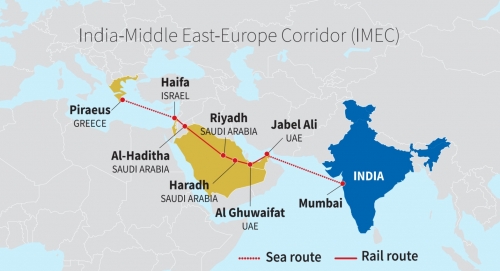
Pour comprendre le véritable plan du cabinet Netanyahu et de ses radicaux, il convient de garder à l'esprit les réflexions de Trump sur la bande de Gaza, où il a fait allusion à la "mer" qui baigne la région libérée de la Palestine. Le meurtrier de Soleimani et de Muhandis faisait référence à la mer Méditerranée, qui est un point clé du parcours du soi-disant "corridor indien". Ainsi, les paroles de Trump concernant Gaza et l'expansion de l'intervention sioniste vers l'est doivent être considérées dans le cadre de la création d'un corridor économique et de transport "Inde-Moyen-Orient-Europe" (IMEC), qui a été officiellement présenté lors du sommet du G20 en septembre 2023. Le "renaissance" du plan de construction de la route indienne vers l'UE s'inscrit parfaitement dans la stratégie de Trump pour contrer le projet chinois de la "route de la soie". Ainsi, la nouvelle administration américaine commence modestement, en tentant d'éliminer le HAMAS à Gaza par le biais de la déportation violente des Palestiniens, puis en "s'attaquant" aux autres figures clés de l'"Axe de la Résistance". Cela, dans la logique néoconservatrice, devrait affaiblir les positions de la Chine dans son principal agenda de politique étrangère anti-américaine au Moyen-Orient. En cas de succès des plans des faucons républicains, même Erdogan pourrait être menacé de liquidation, lui qui a auparavant critiqué le "corridor indien" plus que quiconque.
Avec le temps, une série d'experts occidentaux, tenant compte de la lutte entre les deux projets économiques, indiqueront sûrement que le HAMAS a entrepris une "attaque soudaine" contre les sionistes le 7 octobre 2023, afin de faire échouer les plans du G20 pour la construction de l'IMEC. Cependant, les révélations des leaders des Brigades al-Qassam montrent que le HAMAS a porté un coup préventif pour empêcher Netanyahu de commencer l'intervention dans la bande de Gaza. La direction du HAMAS a reçu quelques jours avant son opération un certain nombre de documents selon lesquels les sionistes avaient planifié des frappes aériennes soudaines, suivies d'une invasion terrestre. Ayant obtenu des preuves des plans des "Israéliens", le HAMAS a décidé d'agir en premier. Rappelons maintenant la date de la proclamation du corridor économique "Inde-Moyen-Orient-Europe" et comprenons que Netanyahu a voulu liquider rapidement la "menace palestinienne" à l'égard du corridor indien, mais cela n'a pas fonctionné.
Les sionistes n'ont pas réussi à éliminer militairement l'opposition palestinienne à l'agenda impérialiste de septembre 2023 ; il est maintenant temps de recourir à la diplomatie, d'où la venue de Trump.
12:14 Publié dans Actualité, Géopolitique | Lien permanent | Commentaires (0) | Tags : corridor indien, donald trump, gaza, palestine, levant, israël, proche-orient |  |
|  del.icio.us |
del.icio.us |  |
|  Digg |
Digg | ![]() Facebook
Facebook
samedi, 22 février 2025
Trump est-il "révolutionnaire"?
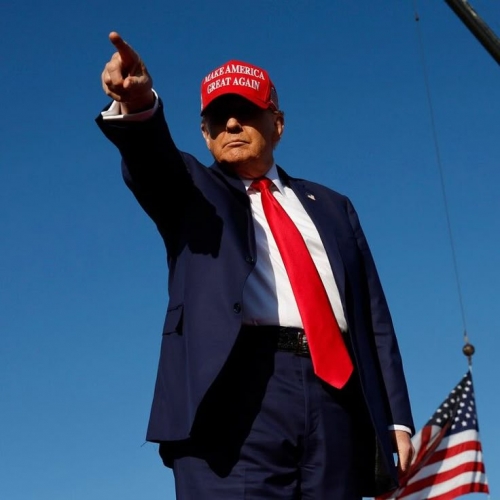
Trump est-il "révolutionnaire"?
Claude Bourrinet
Trump vient de limoger le chef d'Etat major. Ce n'est pas le premier responsable de l'administration de l'empire américain à valser, ce ne sera pas le dernier. Il ne faut pas être impressionné par cette "brutalité" (toute légitime soit-elle, après ce que les démocrates ont fait subir à Trump) : le système des "dépouilles" est de coutume, depuis 1830, depuis Jackson, je crois.
Il ne s'agit pas de penser qu'il s'agisse d'une "révolution", comme je le lis de-ci, de-là, ni d'un bouleversement radical de la "mission" incluse dans le programme presbytérien yankee, de dominer le monde pour son plus grand Bien. La civilisation américaine est intimement calquée sur l'Ancien Testament. Les Américains singent jusqu'à l'absurde la geste biblique, en la prenant à leur compte.
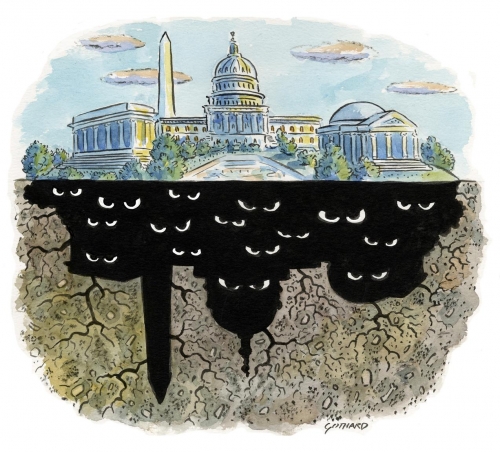
Pour voir clair, il faut se débarrasser d'une lubie qui brouille les pistes et enfume les cerveaux : celle d'Etat profond. Qui dit "profond" dit obscur. Or, s'il est une nation qui rend pratiquement tout "transparent", et où les "secrets", soit sont faciles à reconnaître, soit sont jetés à la lumière du jour tôt ou tard, c'est bien l'Amérique. Nous sommes de sacrés cachotiers, à côté d'eux. Tout simplement, un Etat, comme l'on sait, ne se réduit pas à une structure régalienne. Depuis que l'Etat existe, depuis 5 ou 6000 ans, des "lobbies" l'ont piloté, et des groupes de puissants plus ou moins occultes, mais prévisibles. Ce sera le cas encore avec Trump.
Trump, pour ce qui est de lui, qui est avant tout un homme d'Affaires (mais on sait que les pratiques entrepreneuriales et la politique sont maintenant intimement mêlées), a son modus operandi, certes brutal, mais comme chez tous les patrons yankees.
Toutefois, ne nous trompons pas : il défend les intérêts américains, il a par exemple accentué le surarmement des Ukrainiens, et continué à tromper les Russes avec les accords non respectés de Minsk. Il a tout bonnement pris acte de la victoire russe, et du fait que les Américains ont, somme toute, rempli en partie leur programme, qui était de piller l'Europe, de l'affaiblir, voire de la détruire, et, SURTOUT, de la détacher de la Russie, pour empêcher un axe Paris-Berlin-Moscou. Mission accomplie !
Trump, du reste, comme pratiquement tous les Américains, déteste et méprise la Vieille Europe, non seulement parce que l'élite de cette dernière est complètement pourrie, mais aussi pour ce que nous avons été.
Reste à ralentir le déclin.
Certes, l'"Occident" collectif a essuyé un revers, et surtout l'Europe, qui ne s'en remettra pas. On voit bien, au demeurant, que le concept inepte d'"Etat profond" sert à ne pas identifier les vraies causes de la décadence. En effet, l'Etat profond, assimilé au wokisme, au gauchisme et à la caste transnationale, permet de dédouaner la droite dure. Le coeur du système n'est pas mis en cause, le libéralisme (actuellement à tendance libertarienne), la technoscience (maintenant versée dans le transhumanisme), la société de consommation, qui présente des symptômes de mort (addictions aux plaisirs les plus déshumanisants, acceptation de l'avortement, féminisme hystérique, individualisme, matérialisme, abandon à la loi du marché, au fric, à la vulgarité culturelle, au monde des objets, absence de solidarité, de projet humaniste véritable, destruction du savoir et de l'Ecole, productivisme délétère, vulnérabilité, précarité, faiblesse intellectuelle et porosité à la propagande, et je ne parle pas du suprémacisme "blanc", qui est réel, avec le racisme.... Si l'on identifiait, comme un médecin, comme l'avait fait en partie Patrick Buisson, comme le fait Emmanuel Todd, les causes de la maladie, on éviterait des enfantillages.
Mais les droitards scieraient la branche où ils sont assis (ce sont des parvenus, des "assis"). Leurs connivences trumpistes (voire leur corruption) ne sont pas surprenantes. Ce sont des occidentalistes, avec tout ce que suppose cette appartenance en termes d'aberrations et de crimes. Pas étonnant non plus qu'ils soutiennent Israël. Les grossières erreurs (ou l'hypocrisie très intéressée de parvenus) commises à propos du conflit en Ukraine, et aussi par rapport au génocide perpétré en Palestine, ne laissent rien présager de bon de ces esprits tortueux avides de fauteuils et de privilèges honorifiques, et surtout plus concrets.
Vu la masse considérable d'enfumés, je pense que l'"Occident" (puisqu'il faut bien l'appeler de ce nom) ne risque pas de sortir du ravin. Mais sa nature le portait à s'y jeter. Trump est un "occidentaliste" de la pire espèce, à sa manière, qui est celle d'un Yankee. Il réduit la voilure, parce qu'elle commençait à se déchirer. Il voit aussi que l'Amérique est en décadence, peut-être définitive, comme l'a démontré Emmanuel Todd dans La Défaite de l'Occident. C'est un réaliste, non un révolutionnaire. Mais un Américain, et il prend en charge le projet millénariste de l'Amérique : ce qui est américain est grand, et a vocation à s'universaliser. Toutefois, la première tâche est de se refaire les muscles. En attendant, il ne change rien au projet colonialiste au Proche-Orient, ni à la volonté de neutraliser la Chine. On verra plus tard pour la Russie.
15:50 Publié dans Actualité | Lien permanent | Commentaires (1) | Tags : actualité, donald trump, états-unis |  |
|  del.icio.us |
del.icio.us |  |
|  Digg |
Digg | ![]() Facebook
Facebook
lundi, 17 février 2025
Les six points du (faux) plan de paix de Trump pour l'Ukraine
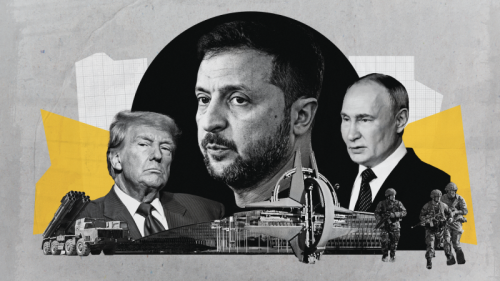
Les six points du (faux) plan de paix de Trump pour l'Ukraine
par Giuseppe Masala
Source: https://www.sinistrainrete.info/articoli-brevi/29850-i-se...
Le Daily Mail a présenté les points de la « feuille de route » américaine. Il s'agirait d'une grave défaite politique et diplomatique de la part de la Russie
Au fil des jours depuis l'entrée de Donald Trump à la Maison Blanche, les rumeurs d'un éventuel sommet entre le tycoon américain et le président russe Vladimir Poutine se font de plus en plus insistantes, dans le but de débloquer au plus vite la crise ukrainienne et de la ramener à une résolution du conflit par la diplomatie.
Outre les rumeurs évoquant la possibilité d'un sommet entre les deux dirigeants, les rumeurs se font de plus en plus insistantes sur les points possibles de la feuille de route qui devrait conduire à la paix en Europe de l'Est. À cet égard, un article du journal britannique Daily Mail a présenté hier le plan possible proposé par la partie américaine.
Selon le journal britannique, les points de la feuille de route pour la paix en Ukraine, étudiés par l'équipe de Trump, seraient les suivants :
- Zelensky doit accepter un cessez-le-feu d'ici le 20 avril, afin de mettre un terme à l'avancée de la Russie ;
- Une déclaration annonçant officiellement l'interdiction pour l'Ukraine d'adhérer à l'OTAN doit être signée ;
- Kiev reconnaîtra la souveraineté de la Russie sur les zones occupées (qui ont déjà été annexées par la Fédération de Russie en vertu du droit constitutionnel) et se retirera de l'oblast russe de Koursk ;
- Une zone démilitarisée (dont la profondeur n'a pas été précisée) sera établie sur la ligne de contact entre les deux forces armées ;
- Cette zone démilitarisée sera gardée par des troupes européennes et éventuellement britanniques. La zone démilitarisée sera donc gardée par des troupes européennes et éventuellement britanniques, mais aucune troupe américaine ne sera envoyée ;
- La reconstruction de l'Ukraine sera financée par des investissements de l'UE estimés à 486 milliards d'euros sur une décennie ;
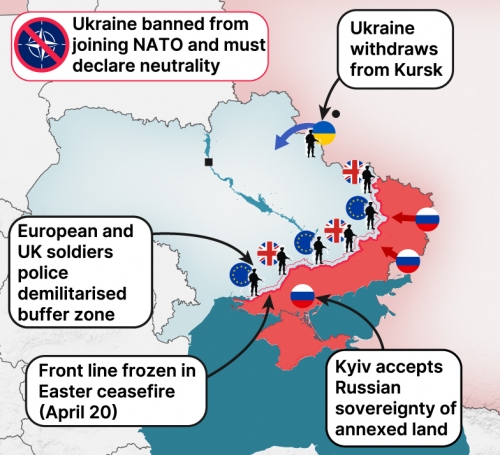
En ce qui concerne le calendrier de mise en œuvre de l'accord, la feuille de route publiée par le Daily Mail prévoit ce qui suit :
a) Des entretiens téléphoniques entre Zelensky et Poutine d'ici février ;
b) Une rencontre entre les dirigeants serait prévue fin février ou début mars ;
c) Le 20 avril, la déclaration de cessez-le-feu serait annoncée ;
d) Le 9 mai, les termes de l'accord seront rendus publics, ce qui permettra d'éviter l'imposition de la loi martiale et la mobilisation.
En outre, une aide américaine supplémentaire sera fournie - on ne sait pas exactement à quel titre - également en termes militaires, afin de faciliter l'adhésion de l'Ukraine à l'UE d'ici 2030.
Un plan de paix, comme on peut le voir, à étapes forcées et très habilement conçu pour laisser, à la lecture superficielle, le sentiment d'un accord égalitaire qui tente de servir de médiateur entre les intérêts de tous. Mais en réalité, il s'agit d'un accord qui sanctionnerait la nette défaite de la Russie sur le plan diplomatique. En d'autres termes, la Russie, après avoir vu ses armées clairement victorieuses sur le champ de bataille, devrait accepter une défaite nette sur la table diplomatique.
Cette thèse peut être soutenue, tout d'abord, sur la base de ce que les Russes ont déclaré en 2021 dans leurs lettres aux États-Unis et à l'OTAN (et les sommets de Genève qui ont suivi), dans lesquelles ils ont exigé une nouvelle architecture de sécurité européenne qui prévoyait essentiellement le retrait des armes nucléaires américaines du théâtre européen, le retrait des troupes de l'OTAN sur leurs positions de 1991 (comme l'avait d'ailleurs promis le secrétaire d'État américain de l'époque, James Baker) et, bien sûr, la promesse solennelle que l'OTAN ne s'étendrait plus jamais vers l'est en menaçant directement la Russie.
De toutes ces exigences, il n'y a aucune trace dans la proposition de paix que les Américains voudraient imposer, et même, à y regarder de plus près, il y a un rejet total des vraies demandes russes. D'une part, en effet, l'accord proposé traite le conflit ukrainien comme un simple différend territorial, sans tenir compte du fait que le véritable conflit n'était pas entre la Fédération de Russie et l'Ukraine, mais entre la Fédération de Russie et l'OTAN qui se cachait derrière le paravent du gouvernement fantoche de Kiev. Comme si cela ne suffisait pas, l'utilisation prévue de troupes européennes et britanniques sur la ligne de front du conflit en tant que forces d'interposition aboutirait au résultat paradoxal que les troupes de l'OTAN se trouveraient toujours à la frontière de la Russie. Peu importe que la « marque » de ces troupes ne porte pas les symboles graphiques de l'OTAN mais ceux des puissances européennes et l'Union Jack, il s'agirait toujours de troupes des pays de l'OTAN. En d'autres termes, nous assisterons au paradoxe suivant : après avoir vu la Russie entrer en guerre pour que l'Ukraine ne rejoigne pas l'OTAN, nous verrons l'OTAN entrer en Ukraine sous le déguisement de troupes de maintien de la paix.
Une autre question à ne pas sous-estimer est l'entrée de l'Ukraine dans l'Union européenne, essentiellement promise par Washington. Outre la saignée que l'Europe devrait subir pour reconstruire l'ancien pays soviétique, il ne faut pas oublier un autre aspect fondamental: l'UE travaille à la mise en place de l'Armée unique européenne. Le problème de base se poserait donc à nouveau: l'OTAN entrerait de facto en Ukraine pour la simple raison que l'Ukraine, en rejoignant l'UE, participerait à l'armée européenne, qui est principalement composée de pays qui appartiennent également à l'OTAN. Si ce n'est pas de la soupe, c'est du pain mouillé !
Bref, à y regarder de plus près, le plan américain semble avoir été conçu par des joueurs à trois cartes dans le but d'escroquer les pigeons qui leur tombent sous la main. Mais le fond du problème est tout autre: un vieux renard de la diplomatie comme Sergey Lavrov ne risque pas de se faire rouler dans la farine, et ils ne peuvent pas le savoir à Washington.
Dès lors, une question fondamentale se pose: le plan américain a-t-il pour objectif réel de parvenir à la paix ou veut-il simplement pousser la Russie à renverser la table diplomatique en faisant porter à Moscou la responsabilité d'une aggravation (voire d'une extension) du conflit ?
21:03 Publié dans Actualité, Affaires européennes | Lien permanent | Commentaires (0) | Tags : europe, affaires européennes, ukraine, russie, politique internationale, donald trump |  |
|  del.icio.us |
del.icio.us |  |
|  Digg |
Digg | ![]() Facebook
Facebook
vendredi, 14 février 2025
La guerre "douanière" de Trump
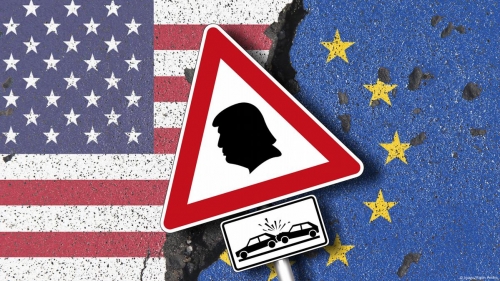
La guerre "douanière" de Trump
Andrea Marcigliano
Source: https://electomagazine.it/la-guerra-doganale-di-trump/
Pour nos médias, il ne s'agirait que d'une énième excentricité. Du comportement atypique et insensé du magnat devenu, pour une raison étrange, président des États-Unis. Et ce, malgré le fait que des commentateurs italiens, même éminents, nous avaient répété à l’envi qu’il n’avait aucune chance. Que la nouvelle présidente serait Kamala Harris. Parce qu'eux, les médias et les commentateurs italiens, auraient voté ainsi.
Dommage, cependant, que le président des États-Unis soit élu par les Américains. Tous les Américains, pas seulement ceux, peu nombreux, au ton suffisant et aux manières affectées qui peuplent Manhattan ou le centre de San Francisco.
Ainsi, Trump a triomphé. Et il a immédiatement commencé à redistribuer les cartes. À faire comprendre ce que représentera ce deuxième mandat.
D’abord pour les États-Unis. Ensuite, aussi, pour l’Europe. Ou plutôt pour ces « alliés » européens qui ont encore du mal à piger ce qui adviendra. Et qui continuent à se complaire dans leur insouciance béate et stupide.
Prenons un exemple: la question des droits de douane. Trump a d’abord menacé d’en imposer au Canada, au Mexique et à ses voisins les plus proches. Les plongeant ainsi dans une panique totale.
Les réactions, bien sûr, ont été variées. De l’indignation canadienne à la menace mexicaine de se tourner vers d’autres partenaires. Une menace qui reste à vérifier, puisque le Mexique importe des États-Unis plus de 70% de ses besoins. Il en est pratiquement totalement dépendant, et un changement radical de fournisseurs serait assurément difficile. Et certainement pas indolore.
Naturellement, Trump a frappé fort. Il a parlé à l’un pour que l’autre comprenne. Et il a obtenu un résultat précis presque immédiatement. Le Canada et le Mexique se sont, de fait, aussitôt réalignés sur Washington. Le risque d'une guerre douanière est trop élevé. Et eux, clairement, ne peuvent pas se le permettre.
Cependant, il ne s’agissait pas seulement d’une menace destinée à ramener à la raison des voisins quelque peu récalcitrants.
Trump leur a parlé, mais surtout pour faire comprendre au reste du monde l’atmosphère du moment.
Et c’est, très clairement, une atmosphère d'orage.
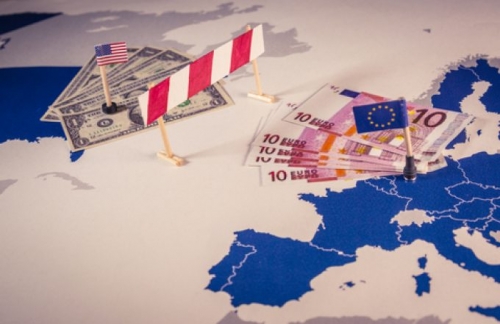
Surtout pour l’Union européenne.
Car, certes, Trump utilise les droits de douane comme une massue contre tout le monde. Y compris contre les Russes et les Chinois.
Toutefois, avec la Russie, il a actuellement d’autres priorités. Il doit négocier, avec son « ami » Poutine, la question de l’Ukraine.
Et avec Pékin, les intérêts communs sont trop imbriqués, avec des participations financières chinoises dans l’industrie américaine, pour qu’un affrontement direct soit envisageable.
On parle de droits de douane à 10%. Un chiffre élevé, mais somme toute acceptable.
Ainsi, le véritable objectif que vise la politique douanière de Trump est un et un seul: les pays de l’Union européenne.
Ces pays qui se sont laissé dépouiller de toute prérogative par les administrations américaines précédentes. Réduits à l’état de vassaux dépourvus de classes dirigeantes. Privés de toute autonomie.
Et qui, pourtant, restent attachés à une image de l’Amérique qui n’existe plus. Qui s’est évanouie avec l’entrée triomphale du magnat à la Maison-Blanche.
Car derrière Trump, il n’y a pas le vide. Il y a l’Amérique profonde. Celle qui travaille et qui produit. À mille lieues de cette Europe et de sa mentalité.
Et pour l’Amérique de Trump, l’Europe – ou plutôt les États européens – sont aujourd’hui un fardeau. Un coût, puisqu’ils exportent et vendent bien plus aux États-Unis qu’ils n’importent. Et Trump entend changer cela. Radicalement.
A-t-il raison ? A-t-il tort ? Sincèrement, je crois que ce n’est pas la question.
Il a bien l’intention d’aller jusqu’au bout. Et, honnêtement, je ne vois pas ce qui pourrait l’arrêter.
Les conséquences sur nos systèmes industriels et nos économies sont assez faciles à anticiper.
Ce sera un tournant. Extrêmement rude.
Et pour nos vies… eh bien, je vous laisse l’imaginer. Je ne pense pas que ce soit bien difficile…
20:20 Publié dans Actualité | Lien permanent | Commentaires (0) | Tags : états-unis, donald trump, europe, droits de douane, politique internationale |  |
|  del.icio.us |
del.icio.us |  |
|  Digg |
Digg | ![]() Facebook
Facebook
jeudi, 13 février 2025
La géopolitique du trumpisme
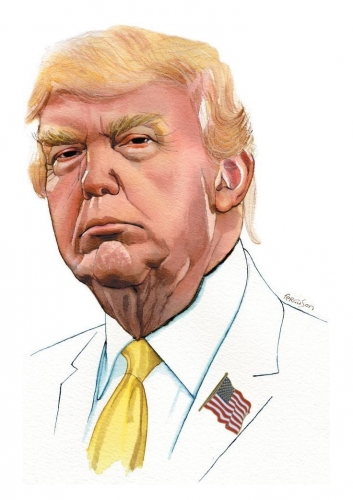
La géopolitique du trumpisme
par Daniele Perra
Source : Daniele Perra & https://www.ariannaeditrice.it/articoli/geopolitica-del-t...
Les premières semaines de la présidence Trump ont clairement dessiné les objectifs géopolitiques de la « nouvelle » administration.
1) L'exclusion de l'Europe des routes arctiques ;
2) Se décharger sur l'Europe elle-même du fardeau et de la destruction causés par le conflit en Ukraine ;
3) L'acquisition d'une position forte en Méditerranée orientale, à Gaza (à proximité d'importants bassins gaziers et du canal de Suez, afin de pouvoir contrôler directement les flux d'énergie vers l'Europe) ;
4) désarticulation totale de l'existence du Mexique en tant que nation et contrôle total du golfe du Mexique et de la mer des Caraïbes (solution finale aux « problèmes » constitués par le Venezuela et par Cuba) ;
5) réappropriation totale du contrôle du continent ibéro-américain.
En ce qui concerne le point 5, il me semble important de garder à l'esprit les concepts de « synchronie » et d'« asynchronie » entre l'Argentine et le Brésil. Il est clair que l'objectif des Etats-Unis, dans ce cas, est de s'assurer qu'il n'y ait pas de « synchronie » géopolitique entre les deux pays. Leur trop grande proximité est en effet considérée comme très risquée pour l'hégémonie nord-américaine dans la région (Alberto Burla docet). Dès lors, paradoxalement, il est toujours préférable pour Washington que les deux États soient dirigés par des gouvernements mutuellement hostiles (Lula contre Milei, Bolsonaro contre Fernandez auparavant). Un tel système, soit dit en passant, était également évident à l'époque des dictatures militaires (il ne faut pas oublier que la dictature « anticommuniste » de l'Argentine était soutenue par l'URSS, Cuba, le Pérou, la Libye et l'Angola pendant la guerre contre le Royaume-Uni au sujet des Malouines - un avant-poste clé pour le contrôle de l'espace maritime de l'Amérique du Sud).
Tout aussi intéressant est le fait que le renouvellement périodique de l'intérêt des États-Unis pour l'Amérique latine s'accompagne toujours d'une croissance de l'influence israélienne dans la région (les cas de Bolsonaro, soutenu par la mafia juive au Brésil, et de Milei, en ce sens, sont évidents). Il faut également garder à l'esprit le fait qu'Israël considère la région comme un nouveau bassin démographique. Par conséquent, sa déstabilisation est la bienvenue (soutien aux groupes paramilitaires colombiens, par exemple, utile pour générer des flux migratoires vers Israël).
Il est également important de noter que l'expansion des États-Unis s'accompagne toujours du rôle pertinent des sectes évangéliques judéo-protestantes.
Il est curieux que Trump ait été qualifié de « premier président juif des États-Unis ».
Ici, l'objectif est de limiter le rôle de l'Église catholique en Ibéro-Amérique ainsi que le risque qu'elle exerce une influence sur la population latina (croissante) aux États-Unis eux-mêmes. Comme l'enseigne Carl Schmitt, l'anticatholicisme est une caractéristique essentielle de la colonisation anglo-saxonne en Amérique du Nord. En effet, tout au long du 18ème siècle, des lois anticatholiques ont été promulguées. Et au 19ème siècle, être catholique était considéré comme une étiquette infamante. D'autre part, une grande partie des migrants italiens arrivés dans le « Nouveau Monde » ont fini par remplacer la main-d'œuvre esclave.
Quoi qu'il en soit, l'alliance entre le fondamentalisme évangélique et le fondamentalisme juif apparaît de plus en plus évidente. Là où le premier cherche à retrouver une volonté de puissance « perdue » en s'appuyant fortement sur les fondements religieux des États-Unis (pensons au phénomène des « grands réveils » récurrents qui caractérisent l'histoire des États-Unis et à l'idée d'un contact direct entre Dieu et les premiers colons), le second cherche à contrôler et à orienter à son profit l'énorme capacité économique et militaire de l'Amérique du Nord.
Il va sans dire que l'objectif du « fondamentalisme », sous toutes ses formes, est toujours d'éliminer les « ennemis intérieurs » en premier lieu. Ainsi, le trumpisme se manifeste comme la première phase d'une « guerre civile occidentale » qui sert de prélude à un « conflit mondial entre civilisations » ultérieur et plus large.
16:58 Publié dans Actualité, Géopolitique | Lien permanent | Commentaires (0) | Tags : actualité, politique internationale, géopolitique, états-unis, donald trump |  |
|  del.icio.us |
del.icio.us |  |
|  Digg |
Digg | ![]() Facebook
Facebook
mardi, 11 février 2025
Trump et Jurassic Park

Trump et Jurassic Park
Par Marco Travaglio
Source : Il Fatto Quotidiano & https://www.ariannaeditrice.it/articoli/trump-e-jurassic-...
En deux semaines, Trump a réussi à faire détester l'Amérique par le monde entier à coups de déclarations fracassantes, de menaces, d’ultimatums et de droits de douane. Un chaos planétaire, un gigantesque nuage de fumée qui a enveloppé la Terre : ce n’est que lorsqu’il se dissipera que nous comprendrons s’il y a une quelconque logique dans cette folie. Un seul fait semble évident : l’approche commerciale, voire immobilière (cf. Gazaland), des crises internationales est une nouveauté absolue qui balaie celle, idéologico-moralisatrice, que les États-Unis avaient adoptée jusqu’ici, masquant leur impérialisme sous couvert de lutte contre les empires du mal, de guerre contre le terrorisme, d’exportation de la démocratie et autres appâts pour crédules. Mais tandis que Trump perd la tête – ou feint de la perdre (cela reste à voir) – en bouleversant le monde du jour au lendemain, ceux qui devraient réagir en sont encore à l’âge de pierre.
Il suffit de lire le dernier discours style Jurassic Park de Mattarella, qui compare la Russie au Troisième Reich, Poutine à Hitler, le Donbass à l’Europe envahie par les nazis, et donc les négociations Moscou-Kiev à la Conférence de Munich de 1938, qui mena à la Seconde Guerre mondiale. Il découvre soudainement l’urgence d’être des acteurs plutôt que des vassaux des États-Unis (ah bon? Il était temps!) et de se tourner vers l’ONU et ses dérivés. Mais il oublie qu’en 1999, un gouvernement dont un certain Mattarella était vice-président s’était moqué de l’ONU et avait participé aux bombardements de l’OTAN sur Belgrade, première violation de la légalité internationale qui conduisit ensuite à la reconnaissance du Kosovo pour démanteler la Serbie, en contradiction avec une résolution de l’ONU – un précédent dont Poutine s’est ensuite servi pour faire de même en Crimée et dans le Donbass.
Voilà à quoi se résument aujourd’hui les classes dirigeantes européennes: discréditer les négociations naissantes entre la Russie et l’Ukraine et en attribuer tout le mérite à Trump, Orbán & Co. Pendant ce temps, elles continuent d’obéir aveuglément à Trump sur les sujets où nous devrions justement nous rebeller: la course aux armements et les sanctions qui nous forcent à acheter encore plus d’armes et de gaz aux États-Unis. Alors que Meloni s’efforce d’atteindre les 2% de dépenses militaires, les euro-déments pensent déjà à passer à 3 ou 4% pour complaire à The Donald, qui nous en demande 5% (tandis que les États-Unis en sont à 3,4%). Et il ne se trouve personne – pas même Schlein, pourtant adepte des « vrais sujets concrets » – pour remettre en question cette folie belliciste et antisociale qui gonfle les voiles des néonazis partout en Europe.
La Russie, contrairement à nous, est en guerre, et pourtant elle consacre 400 milliards de dollars par an à la défense – soit un tiers de moins que l’UE, qui, avec 1,9% de son PIB, en dépense 530. Pourquoi devrions-nous encore nous saigner à blanc, si ce n’est pour enrichir les industriels de l’armement américains? Et qu’attend l’UE pour lever les restrictions sur le gaz russe et intensifier ses relations commerciales avec la Chine afin de contrer les droits de douane? Trump, comme ses prédécesseurs, défend les intérêts des Américains. Ici, nous attendons toujours quelqu’un qui défende enfin les intérêts des Européens.
21:14 Publié dans Actualité | Lien permanent | Commentaires (0) | Tags : actualité, donald trump, europe, états-unis, politique internationale |  |
|  del.icio.us |
del.icio.us |  |
|  Digg |
Digg | ![]() Facebook
Facebook
jeudi, 06 février 2025
USAID, America First et la diplomatie du Big Stick de Trump
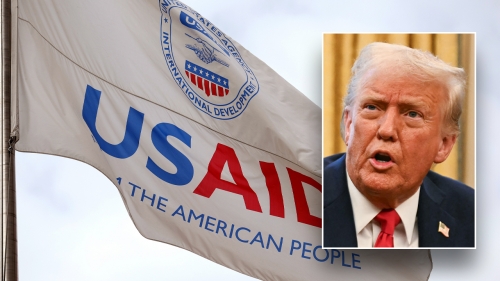
USAID, America First et la diplomatie du Big Stick de Trump
Brecht Jonkers
Source: https://brechtjonkers.substack.com/p/usaid-america-first-...
Les coupes budgétaires et la répression déclenchée contre l’USAID par le gouvernement Trump ont du sens dans une perspective « America First » et sont globalement une bonne chose pour la plupart des pays du monde. Cependant, ce n’est pas aussi radical et révolutionnaire que certains voudraient nous le faire croire.
L’USAID est un élément clé du complexe industriel des ONG servant à l’infiltration impérialiste, utilisé depuis des décennies par le Département d’État et la CIA pour déstabiliser, renverser et asservir des pays souverains à travers le monde.
De sa collusion avec les sionistes en Asie occidentale à son influence sur les élections en Amérique latine, en passant par son implication directe dans la stérilisation forcée des populations autochtones au Pérou dans les années 1980 – une véritable campagne de nettoyage ethnique –, l’USAID fait partie du complot impérialiste visant à maintenir le tiers-monde sous contrôle, anesthésié et dépendant de la « bienveillance » du cœur impérial.
Le démantèlement de cette abomination est, en grande partie, une bonne chose. Cependant, il s’avère que l’USAID ne sera pas totalement supprimée, mais plutôt réduite, réorientée et profondément remaniée.
Trump a fixé un objectif clair: faire en sorte que l’Empire américain se recentre sur lui-même, plutôt que de risquer un surmenage impérial total, comme le prônent les néoconservateurs et les libéraux démocrates. C’est un principe de « surveillons notre arrière-cour », bénéfique pour la majeure partie du monde. Pour l’ensemble de l’Eurasie et de l’Afrique, un repli isolationniste des États-Unis est une véritable bénédiction.
Cependant, il est important de noter que « l’arrière-cour » dont parlent Trump et son équipe correspond à tout le continent américain. Comme à l’époque où la doctrine Monroe fut initialement formulée en 1823, cette vision est imprégnée de l’illusion du « Destin manifeste », selon laquelle l’ensemble du continent, de l’Alaska à la Patagonie, appartiendrait en fin de compte à la suzeraineté de Washington.
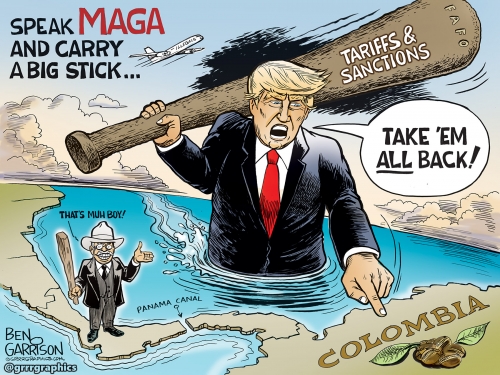
Ceci, combiné au fait que Trump comprend la nécessité de choisir des combats qu’il peut réellement gagner, mène à une stratégie typique d’un « empire mourant », qui se débat contre les pays voisins jugés « hostiles ». Qu’il s’agisse de menacer le Mexique de sanctions, de provoquer un conflit avec le Danemark au sujet du Groenland, ou même d’évoquer l’annexion complète du Canada et l’invasion de Panama pour le contrôle du canal, nous assistons à une diplomatie du « big stick » dans la lignée de Theodore Roosevelt.
Pour la majeure partie du monde, cette tendance isolationniste sera un soulagement. Mais pour les nations souveraines d’Amérique latine, en particulier Cuba et le Venezuela (ce dernier étant directement menacé par le Département d’État dirigé par le gusano Marco Rubio), cette période s’annonce particulièrement dangereuse.
18:52 Publié dans Actualité | Lien permanent | Commentaires (0) | Tags : actualité, impérialisme américain, états-unis, donald trump |  |
|  del.icio.us |
del.icio.us |  |
|  Digg |
Digg | ![]() Facebook
Facebook
Trump veut imposer des droits de douane punitifs sur les produits de l’UE
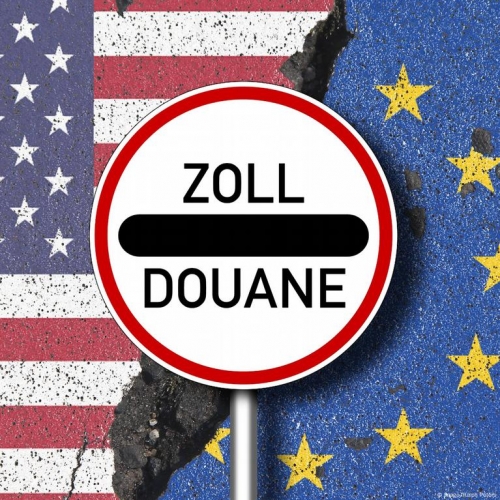
Trump veut imposer des droits de douane punitifs sur les produits de l’UE
Source: https://dissident.one/trump-wil-strafheffingen-opleggen-o...
Le président américain Donald Trump a annoncé qu’il allait imposer des droits de douane punitifs sur les produits en provenance de l’Union européenne. Il a justifié cette décision en dénonçant ce qu’il considère comme des pratiques commerciales déloyales de la part des Européens. Aux États-Unis, des droits d’importation sont déjà en place sur les marchandises en provenance du Canada, du Mexique et de la Chine, rapporte RT.de.
Le président Trump a confirmé son intention d’appliquer ces nouvelles taxes en répondant à une question lors d’une déclaration à la Maison-Blanche, récemment :
« Vais-je imposer des tarifs douaniers à l’Union européenne ? […] Absolument, absolument. »
Et d’ajouter :
« Nous sommes traités de manière exécrable. Ils n’achètent pas nos voitures, ils n’achètent pas nos produits agricoles, en réalité, ils n’achètent presque rien ».
C’est parce que c’est de la camelote. Vos produits agricoles sont remplis de poisons OGM et d’hormones de croissance.
Il existe un énorme déficit commercial avec l’UE. « Nous allons donc prendre des mesures très significatives contre l’Union européenne ». Toutefois, le président n’a pas donné plus de précisions.
Des taxes supplémentaires sur divers secteurs
Trump a également annoncé que les États-Unis allaient, dans les semaines à venir, imposer des droits de douane sur l’acier, le cuivre, l’aluminium et les puces électroniques, ainsi que sur « tous types de médicaments et de produits pharmaceutiques ».
Lors de sa campagne électorale, Trump avait proposé des droits d’importation de 10 à 20% sur les produits venant de tous les pays. À partir du 1er février, des droits de douane étendus entreront en vigueur sur les produits en provenance de Chine, du Canada et du Mexique. Des taxes de 25% sont prévues pour les produits mexicains et canadiens, tandis que les marchandises chinoises seront soumises à un tarif de 10%. Ces nouveaux droits s’ajoutent aux taxes déjà existantes.
L’UE prépare sa riposte
La Commission européenne a commencé dès l’été à préparer la transition vers la nouvelle présidence Trump. Le commissaire européen aux Affaires économiques, le Letton russophobe Valdis Dombrovskis, a déclaré il y a quelques jours à CNBC que l’UE ne resterait pas passive face aux nouvelles taxes imposées par Washington :
« Si nous devons défendre nos intérêts économiques, nous réagirons de manière appropriée ».
Eh bien, faites la paix avec Poutine et rouvrez Nord Stream si vous voulez vraiment riposter, serais-je tenté de dire.
Dès son premier mandat, Trump avait déjà déclenché une guerre commerciale avec l’UE. En 2018, il avait imposé des droits de douane spéciaux sur les importations d’acier et d’aluminium. Bruxelles avait alors répliqué en taxant des produits américains comme le whisky, les motos et les jeans. Après sa réélection en novembre, Trump a menacé les Européens de « tarifs douaniers sans fin » s’ils refusaient d’acheter du pétrole et du gaz américain.
15:26 Publié dans Actualité, Affaires européennes | Lien permanent | Commentaires (0) | Tags : europe, affaires européennes, union européenne, donald trump, droits de douane |  |
|  del.icio.us |
del.icio.us |  |
|  Digg |
Digg | ![]() Facebook
Facebook
Déclaration de la Coordination « Stop à la Troisième Guerre mondiale (STOPWW3) » après la victoire de Trump
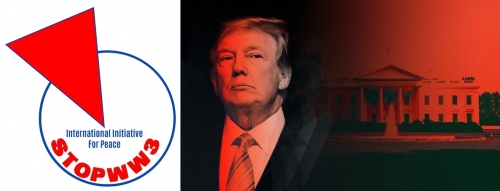
Déclaration de la Coordination « Stop à la Troisième Guerre mondiale (STOPWW3) » après la victoire de Trump
par Dirk W.
L'impérialisme américain était et reste l'ennemi principal
Source: https://zannekinbond.org/verklaring-van-de-coordinatie-stop-de-derde-wereldoorlog-stopwoiii-na-de-overwinning-van-trump/
À la veille de l'inauguration de Trump, nous publions la déclaration de la Coordination « Stop à la Troisième Guerre mondiale » (STOPWW3), dont le Zannekinbond (Flandre) est membre. La déclaration a été rédigée immédiatement après la victoire électorale de Donald Trump le 5 novembre. Après un débat intensif, elle a finalement été approuvée le 29 décembre. Trump prendra ses fonctions de président le 20 janvier. Les déclarations qu'il a faites après sa victoire électorale semblent confirmer notre analyse.
1.
Le monde est entré dans une période d'instabilité et de grands bouleversements. La force motrice de la mondialisation dirigée par les États-Unis est arrivée à son terme. À travers les mesures libérales et par l'arrogance de l'impérialisme, la mondialisation a renforcé les inégalités sociales internes dans tous les pays, creusé les déséquilibres économiques et géopolitiques, et intensifié le pillage des pays pauvres. Les décennies à venir façonneront l'ordre mondial : allons-nous vers une nouvelle mondialisation, et de quelle nature sera-t-elle ? Sera-t-elle polycentrique, ou une autre puissance prendra-t-elle la place des États-Unis ? Ou bien les États-nations reprendront-ils le contrôle en optant pour la voie du protectionnisme et de l'autosuffisance économique ? Lorsque l'ordre mondial et une nouvelle hiérarchie des puissances sont en jeu, la guerre devient inévitable. Si les peuples et les classes opprimés restent à genoux, si la résistance anti-impérialiste ne remporte pas de victoires sur le terrain, alors l'avenir du monde sera décidé dans ce que nous appelons la Troisième Guerre mondiale.
2.
La vengeance destructrice de Donald Trump ne peut être expliquée que dans ce contexte et comme le résultat du conflit interne qui déchire à la fois la société américaine et ses élites oligarchiques. La faction trumpiste se présente comme un mouvement revanchard, malgré l'hétérogénéité de sa base sociale. Sa mission principale est la défense de la suprématie mondiale des États-Unis (MAGA). Sur le plan idéologique, son fondement principal, en plus de traits racistes et misogynes, est un messianisme chrétien-sioniste. Selon cette vision, si la domination mondiale des États-Unis venait à échouer, ce serait la fin du monde. En réalité, la perte par les États-Unis de leur position dominante et parasitaire les plongerait, sinon dans une guerre civile, du moins dans une crise existentielle inévitable.
3.
L'idée d'un accord avec la Russie de Poutine ne doit pas induire en erreur. Il ne s'agit pas d'un nouvel et impossible Yalta que la faction trumpiste imaginerait. La neutralisation du conflit avec la Russie, que l'administration Biden a porté à son paroxysme, est une stratégie dangereuse visant à apprivoiser Moscou et à le détacher de Pékin, afin de concentrer ensuite toutes les forces sur l'affrontement avec la Chine, le seul rival capable de concurrencer les États-Unis pour la domination mondiale. Il n'y a donc pas de place pour les illusions: avec Trump, la paix n'est pas à l'horizon, mais la guerre, simplement menée et manœuvrée autrement. Les Palestiniens, ainsi que les différentes nations anti-impérialistes, le savent mieux que quiconque.
4.
Nous ne pouvons donc pas nous réjouir de la victoire de Trump, mais nous ne pleurons certainement pas la défaite politique de la faction démocrate de l'élite américaine. Nous nous réjouissons plutôt pour une raison fondamentale: lorsque la division et la réticence règnent dans le camp de l'ennemi, c'est une bonne nouvelle pour le camp des amis, pour le camp des nations opprimées et en révolte. C'est également une bonne chose pour les pays qui font partie de la coalition BRICS, encore fragmentée, car toute paralysie, même momentanée, de la machine impérialiste américaine facilite leur lutte pour mettre fin à l'écrasante domination du dollar et jeter les bases d'un ordre multilatéral. Il est bien connu que Trump considère à juste titre le phénomène BRICS comme un danger majeur pour l'hégémonie américaine, et il ne fait aucun doute qu'il fera tout son possible pour y semer la discorde et le diviser avant d’attaquer la Chine. Enfin, il existe une dernière raison pour laquelle la victoire de Trump était le moindre mal: elle a semé le chaos en Europe et accentué le mouvement en faveur de la dissolution de l'Union européenne, un effondrement qui porterait un coup fatal à l’« eurocratie » et au pouvoir de l’empire américain, tout en insufflant un nouvel élan vital aux forces révolutionnaires européennes.
5.
Stop à la Troisième Guerre mondiale – Initiative internationale pour la paix réaffirme son appel à soutenir ceux qui luttent contre l'impérialisme, le colonialisme et le sionisme. Nous devons redoubler d'efforts pour parvenir à la paix avec la Russie et la Chine, d'autant plus que le risque d'une catastrophe nucléaire augmente avec l'escalade de la situation en Occident. Notre engagement pour la paix et la justice n'est ni criminel, ni une trahison. Seul un mouvement de masse uni peut combattre l'oppression intérieure et les guerres à l'étranger. Nous appelons toutes les forces à nous rejoindre dans cette tâche.
Stop à la Troisième Guerre mondiale – Initiative internationale pour la paix
12:34 Publié dans Actualité | Lien permanent | Commentaires (0) | Tags : actualité, donald trump, anti-impérialisme |  |
|  del.icio.us |
del.icio.us |  |
|  Digg |
Digg | ![]() Facebook
Facebook
dimanche, 02 février 2025
La doctrine Monroe, vieille de 200 ans, a-t-elle été «trumpifiée»?
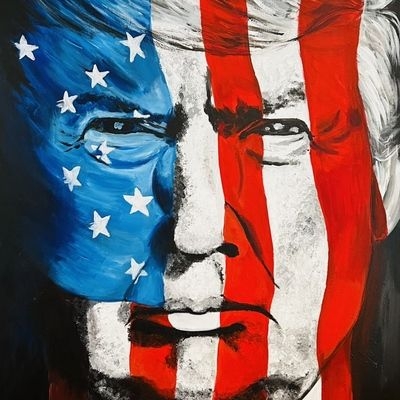
La doctrine Monroe, vieille de 200 ans, a-t-elle été «trumpifiée»?
par Latif Balat
Source: https://telegra.ph/La-Dottrina-Monroe-di-200-anni-%C3%A8-...
Les idées les plus récentes et les plus déroutantes de l'« imprévisible » président Trump ont été ses déclarations sur le Groenland, le canal de Panama et le Canada. Elles sont interprétées comme une version renouvelée de l'expansion impérialiste américaine. Elles sont intervenues à un moment où l'empire américain est perçu comme étant en déclin.
Bien sûr, Donald Trump diffère de ses prédécesseurs dans le bureau ovale par ses caractéristiques sociales et ses traits de caractère. L'une des principales différences est qu'il n'est pas passé par le chemin traditionnel de la bureaucratie américaine, comme le fait d'avoir été membre du Congrès, sénateur ou d'avoir exercé d'autres fonctions au sein de l'État avant de devenir président. Cette divergence par rapport aux normes établies explique ses attitudes « anormales » qui défient souvent les traditions de l'État américain.
Des États-Unis mercantiles
En outre, le passé de Trump en tant qu'homme d'affaires milliardaire est également important. Ses racines dans la classe capitaliste commerciale façonnent ses méthodes et son approche du gouvernement. Ses déclarations économiques et politiques témoignent constamment d'une mentalité de commerçant, même dans les relations internationales.
Bien sûr, il est irréaliste de penser que gouverner une nation de 350 millions d'habitants, dotée de l'économie la plus importante et la plus influente du monde, peut dépendre uniquement de la personnalité et du style de gestion d'un seul individu. Dès le début, Trump a été soutenu par certaines factions du système capitaliste américain. L'ascension de Trump reflète également les traces du conflit de classe au sein des classes capitalistes américaines, parallèlement au déclin de l'économie américaine. Cela se voit très clairement dans le soutien que lui apportent des personnalités telles qu'Elon Musk.
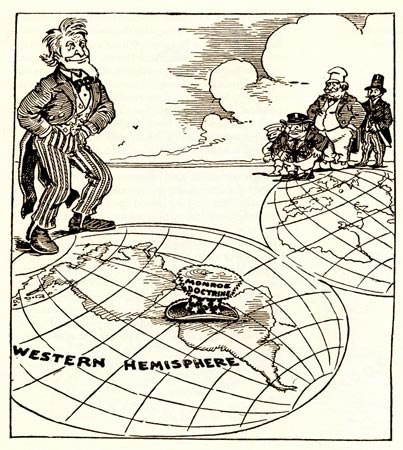
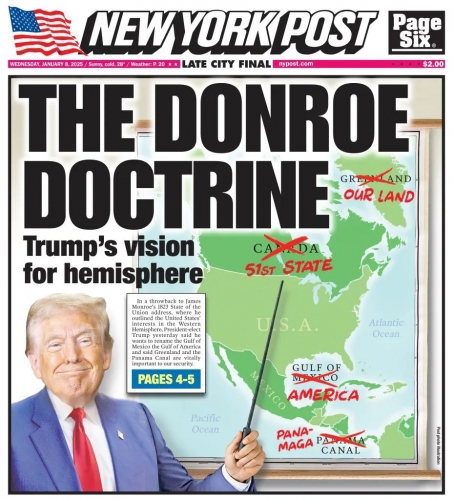
L'élection de Trump ne signifie pas que le réalignement entre les capitalistes est terminé ou qu'il est devenu évident. Il s'agit d'un processus en cours qui devrait s'intensifier au cours de la période à venir. Une étape notable dans cette direction est l'entrée de Liz Cheney, l'une des figures républicaines néoconservatrices les plus en vue, dans les rangs du Parti démocrate. Cheney sera suivie par d'autres.
Passons maintenant aux remarques apparemment étranges mais logiques du point de vue intra-américain de Trump sur le Groenland, le canal de Panama et le Canada :
Une présidence de style "négociation"
Tout d'abord, en tant qu'homme d'affaires, qui comprend la valeur de la négociation et des tactiques pour renforcer sa position de négociation, Trump a fait ces propositions particulières en articulant une stratégie bien calculée. Il sait qu'en présentant de telles idées, il pourra s'asseoir à la table des négociations au départ d'une position plus forte dans ses rapports avec le monde pendant sa présidence. Trump pense que projeter l'image d'un pays plus actif et plus influent, ne serait-ce que sur le plan rhétorique, donnera aux États-Unis un plus grand poids dans les négociations. Il est bien conscient que les frontières et les institutions définies par les accords internationaux et enregistrées par les Nations unies ne peuvent être modifiées par de simples revendications agressives. Trump veut dire à l'Europe et au monde: «Je suis toujours là, actif, et je ne me retire pas». Par exemple, il est impossible que le Canada devienne le 51ème État américain, mais ces déclarations pourraient faire pression sur le Canada pour qu'il accepte des droits de douane plus élevés sur ses marchandises.
Deuxièmement, la rhétorique de Trump s'aligne sur les principes de la doctrine Monroe, formulée par le président Monroe en 1823, qui souligne que l'ensemble du continent américain est exclusivement sous l'influence des États-Unis. Cette doctrine vise à dissuader l'Europe, la Chine et la Russie. Les territoires mentionnés par Trump - le Groenland, le Panama et le Canada - font tous partie du grand continent américain.
Le troisième point important est la tentative des États-Unis de restaurer leur position affaiblie en tant que puissance impérialiste vis-à-vis de la Chine et de la Russie, compte tenu de l'influence croissante de la Russie et de la Chine au Groenland et au Panama, avec des ressources précieuses et le rôle dans l'ouverture de l'Arctique au commerce.
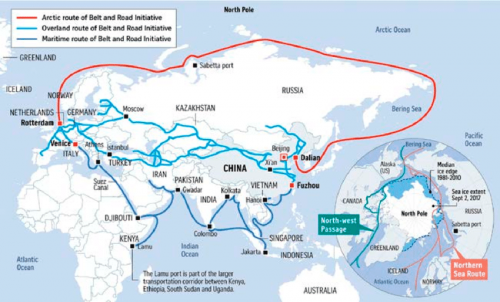
Blocage de la route de la soie arctique
Du point de vue des États-Unis, le Groenland a une valeur géopolitique incommensurable en raison de sa situation aux portes de l'océan Arctique. La région possède non seulement de vastes réserves inexploitées de pétrole et de gaz, mais elle offre également de nouvelles routes maritimes à mesure que la glace fond, ce qui pourrait remodeler la dynamique du commerce mondial. La plus importante est la route maritime du Nord, qui longe la côte russe et traverse le détroit de Béring. Cette route pourrait contourner les itinéraires traditionnels par les canaux de Panama et de Suez et réduire les temps de transit entre l'Asie et l'Europe jusqu'à 40%.
Entre-temps, la Chine a également établi une présence significative dans la région. Se déclarant « quasi-État arctique » en 2018, la Chine a investi dans son initiative de Route de la soie polaire et souhaite intégrer les routes maritimes de l'Arctique dans le cadre plus large de sa grande initiative dite de la Ceinture et de la Route.
Un signe de déclin ?
En bref, la rhétorique vide de Trump sur l'intervention militaire ne doit pas nous détourner de la réalité: l'Arctique est en train de devenir un point de rupture potentiel entre les États-Unis et l'axe Chine-Russie. Cette rhétorique est utile pour suggérer l'orientation possible de la politique étrangère de Trump. Les revendications de Trump sur le canal de Panama, le Canada et le Groenland suggèrent une tentative de remédier au déclin de la puissance mondiale de l'Amérique et à l'excès impérialiste insoutenable. Tout cela suggère un recalibrage des priorités américaines vers une stratégie "continentale" plus gérable, une nouvelle doctrine Monroe visant à rétablir une hégémonie totale sur les Amériques et l'Atlantique Nord en tant que "sphère d'influence naturelle".
Publié en partenariat dans United World International
15:47 Publié dans Actualité, Géopolitique | Lien permanent | Commentaires (0) | Tags : actualité, géopolitique, arctique, doctrine de monroe, donald trump, états-unis |  |
|  del.icio.us |
del.icio.us |  |
|  Digg |
Digg | ![]() Facebook
Facebook
samedi, 01 février 2025
Le monde selon Trump
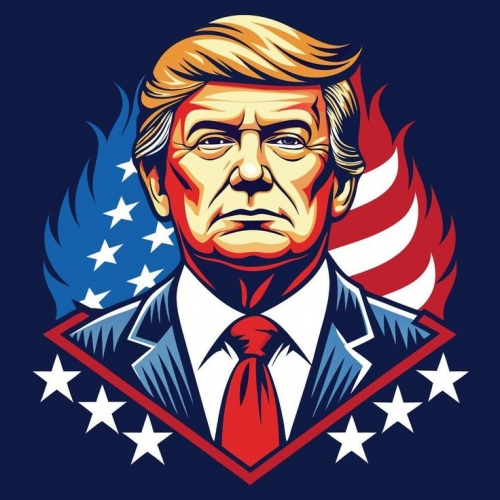
Le monde selon Trump
Andrea Marcigliano
Source: https://electomagazine.it/il-mondo-secondo-trump/
Trump, "The Donald", comme l’appellent ses partisans, n’est certainement pas un politicien taciturne. Surtout maintenant que, revenu triomphalement dans le Bureau ovale, il dévoile à tous comment il voit, et veut, le monde.
Même s’il serait plus juste de dire « comment il voudrait » le voir. Car même pour lui, entre dire et faire, il y a un monde.
Et ce monde est vaste, tumultueux, dangereux.
L'Amérique sous la bannière étoilée
Trump considère les Amériques, du cap Horn au détroit de Béring, comme un territoire devant être sous la coupe de la bannière étoilée. Le Canada devrait être directement intégré aux États-Unis en tant qu’État. Le Mexique, devenir et demeurer une simple extension. Quant à l’Amérique du Sud, avec sa complexité tourmentée, il s’agirait de la normaliser et de la ramener dans le giron américain. Fini les insubordinations andines. Et surtout, fini les ambitions du Brésil de Lula. L’Argentin Milei, lui, deviendrait son proconsul au sud.
Puis, il y a le Groenland. C’est l’Amérique. Point final. La Couronne danoise devra s’y conformer. Et se taire.

Le Moyen-Orient : Israël et les alliés soumis
Le Moyen-Orient, lui, serait laissé aux mains d’Israël et des États arabes prêts à se plier aux volontés de Washington.
Gaza serait entièrement débarrassée des Palestiniens et livrée aux colons armés israéliens. Pendant ce temps, son ami Netanyahu aurait, en substance, carte blanche en Cisjordanie. Parler d’un État palestinien reviendrait désormais à raconter des fables comme celle du Petit Chaperon Rouge.
Quant à la Syrie et au Liban, on verra plus tard. Quoi qu’il en soit, pour le Hezbollah et les Alaouites – qui constituaient la colonne vertébrale du régime d’Assad –, la cloche du glas sonne.
Les Saoudiens et leurs alliés, eux, auraient carte blanche pour anéantir les Houthis du Yémen et clore définitivement ce chapitre.
Le casse-tête iranien
Mais ensuite vient l’Iran. Et là, les problèmes commencent. Car le nouveau président iranien, Masoud Pezeshkian, ne cherche ni tensions ni conflits avec Washington. Il représente en effet les milieux économiques, qui veulent commercer et faire des affaires, et non s’enliser dans une guerre, suicidaire à bien des égards, contre les Américains.
Toutefois, cela ne signifie pas qu’il soit un ami. Ni un adversaire conciliant. Il a ainsi renforcé ses liens avec la Chine d’abord, puis avec la Russie. En quelque sorte, il a sécurisé l’Iran dans un réseau d’alliances que même Trump hésite à provoquer.
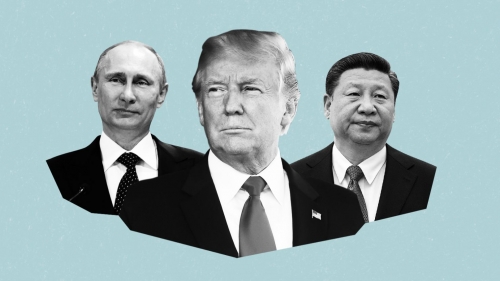
Un monde divisé en trois puissances
La vision du magnat, devenu président pour le deuxième fois, repose sur un monde divisé en trois superpuissances: la Russie, la Chine et, bien sûr, les États-Unis. Ses États-Unis doivent maintenir une position dominante et empêcher les deux autres de se rapprocher. Un « bloc continental » sino-russe rendrait en effet difficile le maintien de la suprématie américaine sur le monde.
C’est pourquoi Trump est prêt, malgré les apparences, à négocier avec Poutine. Lui concéder l’Ukraine et se débarrasser de cette « Union » (façon de parler) européenne, qui lui apparaît de plus en plus comme un frein inutile, un fardeau dont il faut se défaire.
Avec Poutine, il veut – et doit – trouver un accord. Dans l’espoir de briser le lien grandissant entre la Russie et la Chine. Car la Chine est le véritable rival des États-Unis. Leur principal concurrent économique et commercial.
Le monde selon Trump : pragmatisme et suprématie
Voilà, en résumé, le monde selon Trump. Un mélange de réalisme et de revendication altière de la suprématie américaine.
Une vision purement économique, combinée à une poigne de fer pour maintenir les autres à distance. Et surtout, en position de soumission.
Seul le temps nous dira s’il s’agit d’un simple rêve ou si le monde est en train de changer radicalement.
16:59 Publié dans Actualité | Lien permanent | Commentaires (0) | Tags : actualité, donald trump, états-unis, politique internationale |  |
|  del.icio.us |
del.icio.us |  |
|  Digg |
Digg | ![]() Facebook
Facebook
jeudi, 30 janvier 2025
Est-ce la fin du néolibéralisme progressiste?
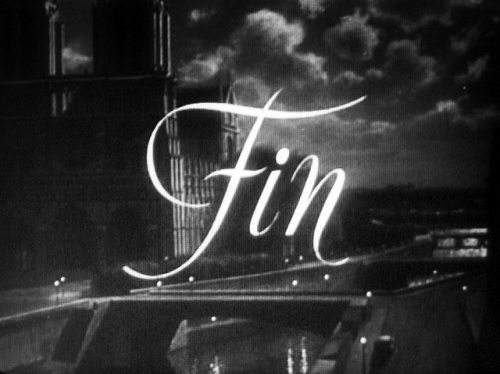
Est-ce la fin du néolibéralisme progressiste?
par Alessandro Volpi
Source: https://www.sinistrainrete.info/articoli-brevi/29723-ales...
Nous devons rester fermes, debout dans le train de l'histoire, parce que les sièges de la raison et de l'erreur sont tous occupés. Nous pourrions résumer ainsi la position que nous, en tant que Slingshot, devrions à nouveau adopter, mais en général, nous, en tant qu'ensemble de citoyens luttant pour une démocratie sociale accomplie, concrète.
Rester ferme ne signifie pas ne pas vouloir voir les transformations en cours et la reconfiguration politique qui, d'une manière ou d'une autre, met un terme à la dernière décennie populiste, nous ne savons pas quelle durée elle aura, mais pour la première fois, nous sommes face à un projet sans précédent. Nous ne pouvons pas ne pas voir comment il y a, dans la nouvelle alliance entre les pouvoirs économiques et politiques de ce nouveau gouvernement Trump, un saut quantique par rapport à celui de 2016.
L'alliance avec Musk et les élites économiques des secteurs les plus avancés du capitalisme américain et l'objectif désormais atteignable d'occuper les appareils militaires et bureaucratiques marque une différence avant tout en termes de capacité à produire une transformation concrète : non plus, comme en 2016, un populisme de droite "au pouvoir", mais une nouvelle idée concrète qui devient "le pouvoir". Cela ne signifie pas que des résistances ne subsistent pas dans divers secteurs de l'appareil militaire, bureaucratique et économico-financier, mais on peut dire - du moins nous semble-t-il à ce jour - que Trump a la possibilité de produire un réarrangement hégémonique intégral.
Ensuite, et c'est le complément nécessaire des aspects plus « structurels », Trump, tout en maintenant des éléments génériquement attribuables à une idéologie de droite conservatrice avec des traits populistes, a en fait réussi, avec cette alliance, à créer un nouveau discours, non plus projeté seulement vers un retour au passé glorieux, mais avec une idée du futur: la colonisation de Mars représente ce désir renouvelé de pouvoir, médiatisé par l'imagination des milliardaires. Ce qui rend cette nouvelle articulation hégémonique inédite, c'est précisément qu'elle a perfectionné ce dispositif du désir: il ne s'agit pas seulement d'une nostalgie, d'une passion ambiguë, mais aussi d'un puissant désir de jouissance projeté vers un avenir glorieux. En ce sens, Musk était ce dont Trump avait besoin pour faire le saut. Cela ne signifie pas - il faut le préciser à nouveau - que cette expérience est nécessairement destinée à réussir, mais qu'il a fait un saut quantique qui lui permet de la faire.

Il semble donc que les jours de ce que nous avons combattu pendant des années sous le nom de néolibéralisme progressiste soient révolus. Et cela implique, en termes stratégiques, une réflexion. Oui, parce qu'en fait, ce qui a vaincu le néolibéralisme progressiste, ce n'est pas une option émancipatrice, populaire et sociale de quelque nature que ce soit, mais une droite qui semble vouloir aller au-delà des deux termes, mais réaffirmer ensemble une nouvelle domination du capitalisme financier sur une base nationale, le contrôle impérial américain, bien que redéfini sur d'autres objectifs que celui, propre à une époque, du bellicisme démocratique, le tout dans une perspective culturellement conservatrice et politiquement autoritaire. Ceux qui aujourd'hui se réjouissent en quelque sorte de la fin de l'ère du néolibéralisme progressiste avec toutes ses dérives culturelles échangent une défaite contre une victoire, à moins que l'objectif ait été, comme c'était légitimement le cas pour une partie de la droite, de gouverner cette transition hégémonique dans un sens régressif.
Pour ceux, en revanche, qui se reconnaissent dans une vision politique radicalement démocratique, populaire et sociale, cette transformation ne peut en aucun cas être considérée comme leur propre victoire, ni comme un processus pouvant tactiquement bénéficier à cette perspective. A moins de considérer la fin attendue du wokisme et la transformation culturelle qui en découle comme sa propre grande victoire, dans l'illusion que le nexus néolibéralisme/progressisme était un nexus structurel, que l'élimination de l'un permettrait d'éliminer l'autre. Ce fantasme qui a conquis une partie de la gauche s'est enivré d'un essentialisme égal et opposé à celui de ceux qui, à gauche, n'ont pas su reconnaître le néolibéralisme progressif parce qu'ils pensaient encore en termes de lien nécessaire entre le conservatisme culturel et le capitalisme, ne comprenant pas ce qu'a été et est l'engouement néolibéral.
En outre, ce type de discours réapparaît largement au sein de la gauche. Il est facile aujourd'hui de montrer comment le capitalisme financier et un conservatisme particulier (en fait celui qui présente des traits futuristes) ont recomposé un nouveau dispositif pour gouverner sous des formes de plus en plus autoritaires la crise galopante de l'Occident.
Mais il est tout aussi facile - et c'est un risque que nous ne pouvons pas nous permettre - de finir par penser qu'autour de ce même bloc politique qui a ouvert la voie à ce changement de paradigme, laissant définitivement les masses populaires aux mains des droitiers, peut renaître aujourd'hui une gauche fadement plus sociale qui défend la démocratie contre les risques autoritaires du trumpisme. Cette volonté de recomposer un front antifasciste faussement social-démocrate est déjà une réalité et constitue la tentative désespérée de certains secteurs des élites politiques et culturelles du néolibéralisme progressiste de continuer à flotter sur la marée noire qui les a submergés. Pour donner un exemple, et pour reprendre un aspect que nous avons évoqué, de même qu'une certaine tendance réactionnaire confond la fin du wokisme avec la fin du néolibéralisme, d'un autre côté, il y a ceux qui pensent qu'une nouvelle gauche peut être relancée sur la justification du wokisme en crise, en partant du fait que la critique du wokisme de droite, qui a triomphé, a jeté le bébé (l'émancipation au sens large) avec l'eau du bain (dérive linguistique, sectarisme, moralisme, etc.). Comme si le wokisme n'avait été que le rideau idéologique du néolibéralisme qui a desservi les combats qu'il était censé défendre.
Dans cette reconfiguration des deux camps, notre tâche, comme toujours, est celle de l'autonomie par rapport aux deux dérives : nous n'avons pas gagné avec Trump comme nous n'aurions pas gagné avec Harris, nous n'avons pas gagné en Italie avec Meloni comme nous ne gagnerons pas avec Schlein. Une fois de plus, le camp du bien et le camp du mal sont occupés et nous ne pouvons que continuer à nous tenir fermement à nos raisons, à nos analyses, en essayant de comprendre les temps à venir.
13:44 Publié dans Actualité | Lien permanent | Commentaires (0) | Tags : néolibéralime, actualité, néolibéralisme progressiste, elon musk, donald trump |  |
|  del.icio.us |
del.icio.us |  |
|  Digg |
Digg | ![]() Facebook
Facebook
mercredi, 29 janvier 2025
La tempête financière (parfaite) que l'administration Trump s'apprête à déclencher en Europe

La tempête financière (parfaite) que l'administration Trump s'apprête à déclencher en Europe
par Alessandro Volpi (*)
Bron: https://www.lantidiplomatico.it/dettnews-la_tempesta_fina...
La présidence de Trump est en passe de déclencher une tempête contre l'Europe. Les signaux sont nombreux. Les « Big Three » — Vanguard, BlackRock et State Street — ont décidé d'étendre leur empire infini en utilisant deux outils supplémentaires.
Le premier, en parfait accord avec la vision trumpienne, réside dans l’adhésion complète aux bitcoins qui, selon Larry Fink, pourraient atteindre une valeur de 700.000 dollars. Ce message, envoyé par le PDG de BlackRock, est véritablement impressionnant par les effets qu'il aura sur les marchés. Cela signifie que l'épargne européenne sera massivement orientée vers les cryptomonnaies, un secteur dans lequel l'Europe est pratiquement absente.
Le deuxième signal vient encore de Larry Fink, qui a exprimé son intérêt pour les titres européens et, surtout, pour l'épargne du Vieux Continent: un intérêt accentué par les craintes de rencontrer davantage d'obstacles sur les marchés américains en raison des « politiques » du nouveau président. Dans ce contexte, les choix de Vanguard et BlackRock, grands actionnaires des banques italiennes par exemple, seront déterminants pour les opérations en cours chez Unicredit, MPS, Mediobanca et BPM. Il est probable, à la lumière de cela, que ces fonds se rangent du côté de ceux qui continuent à leur garantir le monopole de notre épargne gérée.
Il est vraiment curieux, alors, que Giorgia Meloni s’efforce de soutenir et de définir comme nationale une opération telle que celle de la banque MPS, pleinement intégrée dans l'œuvre de colonisation de l'Europe par la finance américaine. En ce sens, avec Trump comme président, la soumission européenne risque d’être encore plus rude, car elle sera l’objet d’une action convergente des Big Three et de l’élite même du président, à commencer par la famille Musk. Et l’Italie se trouve véritablement au cœur de la tempête, incapable de se défendre tout en continuant à pratiquer le culte du capitalisme.
(*) Post Facebook du 27 janvier 2025
16:02 Publié dans Actualité, Affaires européennes | Lien permanent | Commentaires (0) | Tags : finances, blackrock, états-unis, donald trump, europe, affaires européennes |  |
|  del.icio.us |
del.icio.us |  |
|  Digg |
Digg | ![]() Facebook
Facebook
Sur Trump et cette «Amérique qui se moque du monde»…
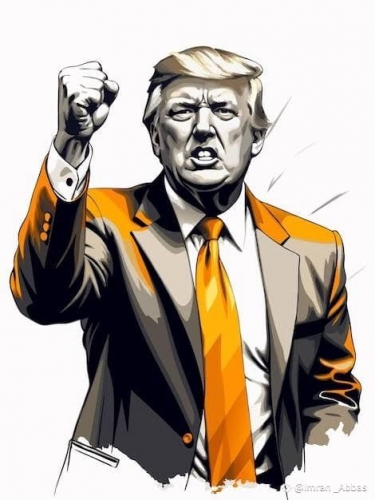
Sur Trump et cette «Amérique qui se moque du monde»…
Nicolas Bonnal
C’est Dominique de Villepin, preux et vain orateur pacifiste en 2003, depuis récompensé par divers scandales qui compromirent son cursus présidentiel, qui a parlé, à propos de Trump, de l’Amérique « qui se moque du monde ». Il faut dire en effet que le Donald a mis les bouchées doubles et qu’il étourdit son monde sans lui laisser de répit. Et que je t’ordonne d’arrêter ta guerre, et que je te demande de me refiler ton pays, le Canada, ou la plus grande île (et dernière île vierge ou presque) du monde, le Groenland, et que je te demande de te taire, et que j’ordonne à ton électorat de voter pour l’extrême-droite allemande devenue plus très souverainiste du coup...
Elle aurait tort de se gêner l’Amérique. Sa balance commerciale extraordinairement déficitaire lui permet de faire chanter tout le monde ou presque, en particulier l’Europe (déjà ruinée sinon anéantie par Biden et son minyan – voyez Kunstler), ou l’arrière-cour latino, toujours plus dépendante de la puissance US. C’est Todd qui remarque - p. 240 de la Défaite - comme ça en passant (mais pourquoi seulement en passant ?) que le Mexique est devenu le satellite industriel de l’Amérique après avoir fait longtemps office de résistant numéro un à l’ogre-oncle Sam: de la même manière la république (et tant pis pour Philippe Roger…) est devenue un larbin intégral des Américains, et ce, vingt ans après le discours de Villepin à l’ONU, en ayant élu en 2007 un président présumé gaulliste ou néo-gaulliste, car on ne sait plus. Les andouilles qui faisaient, depuis Cochin, confiance à Chirac auraient dû regarder d’un peu plus près le CV des députés-maires du 92 en 1983: Sarkozy, Devedjian, Balkany, Noir, Barzach, tous plus socialistes, européens et mondialistes les uns que les autres. Mais le gaullisme fait partie des mythes froncés, et on ne les changera pas ces froncés.
Trump va humilier et ruiner l’Europe un peu plus donc. Le problème est que, tropisme démocrate aidant, les Français et les Européens aiment se faire plumer et humilier par les Huns-démocrates, pas par les autres dits républicains (voyez mon texte et le nom de vos places et de vos rues – Wilson, Roosevelt, Truman, Kennedy…). Ils n’aiment pas Trump puisque leurs médias aux ordres leur ont dit de le détester et que Trump qui a dû lire Guénon comme Bannon pratique la technique de la « folie apparente/sagesse cachée ». Il intrigue ou scandalise et donc imposera plus facilement le programme de la coulisse.
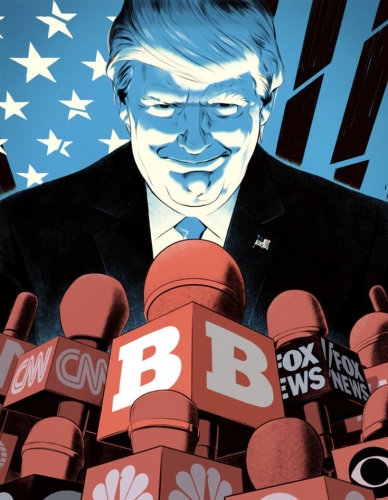
On pourrait donc, comme le pitre Bardella, dénoncer Trump et se mettre un peu plus aux ordres d’Ursula et de son ordre nouveau européen qui passe par toujours plus de vers et d’insectes, toujours plus de vaccins et toujours plus de guerres et d’éoliennes ; et comme Ursula n’est pas en reste, elle va promouvoir comme Adolf la guerre contre l’Amérique après celle contre la Russie. Gageons que quelques frappes commerciales suffiront à calmer l’ire des fous de Bruxelles.
Mais voyons l’argument optimiste. L’idée première serait donc que Trump allant trop loin, et son monsieur Musk qui joue au pitre aussi, bras tendu ou non, le monde européen redresserait la tête et s’éloignerait du parrain américain.
Je ne le crois pas une seconde. Viscéralement russophobes, les pays de l’Est suivront jusqu’en enfer le Donald ; la France totalement « conifiée par les mots » (Céline) et gauchiste à en crever, reniement national inclus, ne peut rien proposer aux Européens qu’un suicide plus rapide. Leur Europe est soit promise à une guerre d’extermination contre la Russie, qui renforcera les intérêts américains, soit à une guerre d’attrition industrielle, qui en terminera avec son économie. Dans les deux cas Trump joue gagnant. On verra comment il mettra au pas séparément chaque pays des Brics. Comme je disais plus haut, cela sert d’avoir le plus gros déficit commercial du monde, déficit éternel que l’on renfloue simplement en imprimant ce dollar-qui-doit-disparaître-très-prochainement. Notre ami Shamir a rappelé que ni le rouble ni le yuan ne jouent de rôle secondaire: ce gentil rôle est échu à l’euro, que les Américains feront disparaître sur ordre, notamment en le faisant numériser par leur agent Christine Lagarde: tout le monde le fuira et ce sera la débandade.

La domination culturelle américaine aussi va se maintenir, surtout s’il faut tenir compte de la montée en puissance de la débilité planétaire. Car la montée de l’intelligence artificielle depuis les années 90 s’accompagne d’un effondrement universel des QI, d’un écroulement des ambitions et des contenus culturels. Relisez Barzun ou Zweig, et comparez le contenu littéraire français du début du vingtième siècle au nôtre pour comprendre. Les dix films les plus vus en 2024 (voir source sur Wikipédia) sont des dessins animés pour enfants (et adulescents, si on veut faire court et gentil): autrement dit Hollywood reste aux commandes mais a liquidé les acteurs, qui n’ont pas pu de ce fait peser sur la dernière élection US ; ils n’existent plus. Dans un monde où l’homme n’existe plus et où le public s’en fout, il va devenir facile de faire régner avec trois oligarques l’intelligence artificielle, dût-on laisser son pré carré à la Chine rétive et surtout moins active que jamais sur le plan géostratégique. Après, on diminuera la taille du troupeau des citoyens superflus et tout le monde sera content. Comprenez le grand incendie en ce sens : l’acteur est aboli. Le nouveau Néron de l’ère numérique, qui abolira l’humain, l’a aboli l’humain. Est-ce un être de chair et de sang ou déjà une matrice informatique qui a bouffé le monde ?
L’Amérique, explique Céline dans le Voyage, c’est le pays de la technique – de la technologie comme on dit aujourd’hui. On sait ce qu’en a dit Bernanos dans sa France contre les robots, France qui n’aura comme prévu par d’autres, opposé aucune résistance. Voyez Cochin ou Drumont et mes textes à ce sujet.
Le Donald lui a parlé d’âge d’or ; il a même parlé de « Our God », notre dieu maçonnique et bien américain. On a aussi cité la quatrième églogue de Virgile et cet âge d’or qui devait revenir après le règne du christianisme, et dont a parlé Dick dans une elliptique et énigmatique (enfin, pas pour moi) nouvelle de neuf pages nommée L’œil de la sibylle.
Tout cela pour dire que l’Amérique se moque du monde et qu’elle a bien raison de le faire. Avec les adversaires qu’elle a ou plutôt qu’elle n’a pas en face d’elle, elle joue gagnant à court et moyen terme.

11:12 Publié dans Actualité | Lien permanent | Commentaires (1) | Tags : actualité, donald trump, états-unis |  |
|  del.icio.us |
del.icio.us |  |
|  Digg |
Digg | ![]() Facebook
Facebook
lundi, 27 janvier 2025
Comme le chat avec les souris (comment construire une alternative à Trump)

Comme le chat avec les souris (comment construire une alternative à Trump)
par Vincenzo Costa
Source : Vincenzo Costa & https://www.ariannaeditrice.it/articoli/come-il-gatto-coi...
Trump joue avec la culture progressiste comme le chat avec les souris. Rien de ce qu’il dit n’est réel, et pour construire une alternative, il faut commencer par se soustraire à son jeu. Lorsque Trump ou Musk parlent ou agissent, ils n’expriment pas ce qu’ils pensent, et leurs gestes ne sont même pas des symboles : ce sont des simulacres, des représentations destinées à d’autres.
Ce ne sont ni des erreurs, ni le signe d’un état d’ébriété avancé, ni d’un trouble quelconque. À ces niveaux, rien n’est involontaire : tout repose sur des analyses, des études, des projets. Ces actes ont un sens, mais ce sens n’autorise pas à révéler leur projet ; il est de forcer le débat sur autre chose.
Leurs paroles et même certains décrets exécutifs ne disent rien de leurs intentions véritables. Leur fonction est opposée : détourner, concentrer l’attention sur autre chose.
Ce sont des milliardaires qui possèdent des données et savent comment fonctionne l’opinion publique progressiste: idéologique, réactive, et, au fond, naïve. Ils le savent très bien et jouent avec cette naïveté. Ils savent que lancer des absurdités, signer certains décrets ou poser des gestes ambigus produit des effets immédiats, envahit et sature l’espace public. Cela le vide de sa substance.
Personne ne sait vraiment ce que Trump fera, ou quel est le projet de Musk. Mais il est certain qu’ils en ont un, et qu’il est puissant. Dans quatre ans, nous vivrons dans un monde différent. L’histoire subira une terrible accélération dans cette période, à tous points de vue.
Et même si nous ignorons leurs intentions, il faut comprendre, si nous voulons vraiment construire une alternative, que ces déclarations sont des spectacles pour captiver le public. Leur but est de diriger l’attention sur certains sujets, pour éviter de parler d’autres questions.
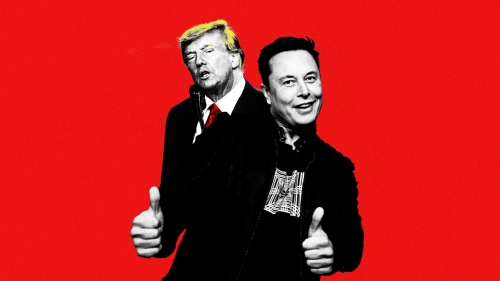
L’objectif est de vider l’espace public : si personne ne sait ce que Trump veut vraiment faire (en Ukraine, face à la Chine, avec la technologie, ou pour l’ordre mondial), alors l’espace public ne peut discuter de rien de concret. Il ne peut que réagir.
Cela empêche l’expression, dans la sphère publique, du malaise qui traverse nos sociétés et l’émergence d’une perspective différente du libéralisme oligarchique dominant.
Trump sait que toute la mythologie progressiste a perdu sa crédibilité. Il va en jouer sans relâche. Lorsque la culture progressiste l’attaque, elle le renforce, car Trump a construit son soutien précisément de cette manière, en exacerbant ces thèmes. Chaque attaque renforce Trump. Il est donc avantageux de stimuler l’indignation de la culture progressiste: décrédibilisée, de plus en plus rhétorique et hypocrite, sourde et arrogante face aux problèmes réels des gens, plus elle critique Trump, plus elle le renforce.
Trump et Musk le savent, car ils disposent des données, ils savent ce qui agite le monde ordinaire. Ils dictent l’agenda : « Parlez de ceci, reprenez vos discours vieux de 40 ans, qui n’ont plus aucun impact sur le réel et que les gens perçoivent comme hypocrites. Nous tirerons de la force de vos critiques. »
Ils savent que les progressistes crieront immédiatement, que l’« antifascisme esthétique » se déclenchera automatiquement. Et ils savent que les gens normaux ont d’autres préoccupations, et que cet antifascisme esthétique ne leur sert à rien.
Cela empêche la naissance d’une alternative qui parle aux gens, qui porte leurs besoins d’émancipation – lesquels ne s’expriment pas dans les termes utilisés par la gauche progressiste de ces 40 dernières années.
Ces simulacres servent à empêcher le débat de se concentrer sur la réalité : c’est la réalité qui ne doit pas apparaître. Et ils savent qu’ils peuvent compter sur les réactions d’une culture aveugle, sur ces idiots qui parlent de « démocratie délibérative », alors que tout le monde au café vous dira : « Mais il n’y a rien à délibérer ! »
Si nous voulons construire une alternative réelle et concrète, il ne faut pas contrer Trump de manière réactive. Il faut comprendre que tout ce qu’ils font et disent ne révèle rien : cela dissimule, cela cache. Personne ne sait quel est leur projet, mais il existe, et il est puissant et déterminé.
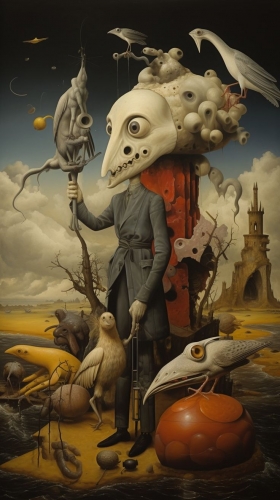
Ces simulacres sont une lutte dans le discours. L’alternative ne naîtra pas en laissant Trump et Musk dicter les sujets. Elle naîtra en imposant d’autres thèmes, qui ne peuvent pas être les vieux chevaux de bataille de la culture progressiste des 40 dernières années.
On ne construit pas une alternative avec cet horizon que les gens ont littéralement vomi, ce qui a perdu toute crédibilité. On ne la construit pas avec des figures qui ont détruit leur propre crédibilité. Rien ne naîtra de discours mièvres et rhétoriques.
Trump et Musk savent qu’ils peuvent compter, aux États-Unis comme en Europe, sur une arme redoutable : l’absence de crédibilité de toute alternative. Ils savent qu’en déclenchant ces mécanismes, la crédibilité de toute opposition diminuera encore davantage.
Si l’on veut – et il le faut – construire une alternative, il faut changer de discours, changer d’horizon de pensée, abandonner les icônes et toute la culture des dernières décennies.
Si cette culture était réellement utile, nous ne serions pas ici. Et si nous en sommes là, c’est parce qu’elle est inutile, sectaire, aveuglante. On peut en faire des séminaires, mais on ne peut pas l’utiliser pour construire une alternative populaire et de masse, qui parle aux gens concrets et donne voix à leurs besoins et à leurs désirs.
19:12 Publié dans Actualité | Lien permanent | Commentaires (0) | Tags : donald trump, elon musk, états-unis |  |
|  del.icio.us |
del.icio.us |  |
|  Digg |
Digg | ![]() Facebook
Facebook
mardi, 21 janvier 2025
Trump et le Groenland
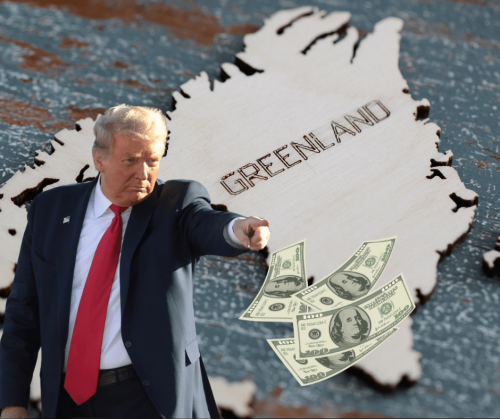
Trump et le Groenland
Par Joakim Andersen
Source: https://motpol.nu/oskorei/2025/01/11/trump-och-gronland/
Lorsque le futur président américain Donald Trump revendiqua à la fois le Groenland et le canal de Panama, sans exclure l'utilisation de moyens militaires, cela suscita une certaine surprise dans le monde entier. Le gouvernement français réagit notamment en déclarant que l'UE n'accepterait pas que des frontières soient modifiées par la violence. Les dirigeants du Danemark et du Groenland soulignèrent que le Groenland n’était pas à vendre. Cela soulève plusieurs questions intéressantes. D'une part, Trump est connu pour sa rhétorique « stratégiquement dramatique », qui fait partie de son « art de l'accord ». Ce qui commence par des menaces de violence et des discussions sur une vente pourrait bien se terminer par l'implantation de quelques bases militaires américaines supplémentaires au Groenland. D'autre part, cette déclaration suggère également une réelle volonté américaine de prendre le contrôle du Groenland, une idée que Trump a déjà abordée par le passé. Le ministre français des Affaires étrangères, Jean-Noël Barrot, a commenté cette situation en affirmant que « l’Europe doit se réveiller », car nous entrons dans un nouvel ordre international caractérisé par le « droit du plus fort ». Vae victis.
Géopolitiquement, cela rappelle la faiblesse de l’Europe. L’Europe n’est pas un acteur sur la scène internationale, ce qui tient en partie aux fondements impolitiques qui servent de base à son unité politique. L’Europe réelle devrait être une communauté fondée sur autre chose que la bureaucratie et l’économie, comme l’ont écrit Jünger, Storey et Evola. Cela signifie que le projet eurocratique est devenu une menace pour les peuples européens et pour leur essence, au lieu de constituer un outil et une expression de celle-ci. Les dirigeants européens d’après-guerre ont largement été des vassaux de l’empire américain, agissant contre les intérêts de leurs propres peuples (voir Jordis von Lohausen).
Sous la présidence de Trump, cela prend une tournure plus aiguë. Nous nous retrouvons dans une situation où, par exemple, Macron représente fréquemment une ligne en politique étrangère qui laisse sous-entendre l'existence d'une force européenne, tout en soutenant une ligne intérieure de faiblesse européenne (en particulier en ce qui concerne la politique d’immigration). Comparé à cela, Trump est souvent favorable aux États-Unis sur le plan intérieur, mais pas toujours aussi bénéfique pour l’Europe sur le plan extérieur. Cela pourrait même, comme le prévient Barrot, signifier que la politique des États-Unis envers les États vassaux européens entre désormais dans une phase d’exploitation et de pillage plus ouvert. Un Europe forte est alors entravée par le politiquement correct et une idéologie hostile aux peuples, et le nœud gordien réside dans l’immigration massive et la légitimité déficiente qu’elle entraîne.
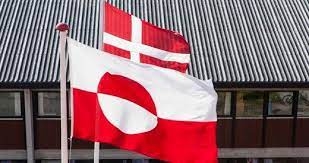
Qu'aucun des deux, le Danemark ni l’Europe, ne doive vendre le Groenland est évident. Cela est d’autant plus vrai qu’une majorité de Groenlandais eux-mêmes sont pour plus d’indépendance et pour une adhésion à l’UE. Le processus d’indépendance se poursuit depuis des décennies et le Groenland reprend progressivement sa souveraineté sur différents domaines. En même temps, le pays reste économiquement dépendant du Danemark: « L’État danois accorde chaque année un soutien financier au Groenland qui s’élevait en 2024 à 4,3 milliards de couronnes. De plus, l’État danois couvre directement des dépenses de plus d’1 milliard de couronnes pour des domaines tels que la défense, la police et le système judiciaire. » Plus d’un Groenlandais sur quatre vit d’ailleurs au Danemark. Les liens entre le Groenland et le Danemark sont considérables, que ce soit sur les plans économique, génétique, onomastique, historique ou religieux. Le paysage politique du Groenland ne semble pas non plus particulièrement compatible avec Trump et le MAGA.

Le parti au pouvoir, Inuit Ataqatigiit, est décrit comme socialiste et a notamment affirmé: « Inuit Ataqatigiit dit non à l’extraction et à l’exportation d’uranium et d’autres minéraux radioactifs… La nature arctique est la réserve alimentaire du Groenland, tout comme de nombreux autres peuples arctiques vivent encore largement de ressources naturelles. C’est pourquoi nous, habitants de l’Arctique, avons un intérêt particulier à ce que la nature arctique ne soit pas polluée par l’extraction d’uranium radioactif et d’autres matières premières toxiques, par des matériaux radioactifs provenant d’accidents dans les centrales nucléaires ou dans des navires à propulsion nucléaire, ou par le dépôt de déchets nucléaires. Nous pensons également que les grandes puissances mondiales doivent procéder à un désarmement surtout sur le plan des armements nucléaires. L’Arctique est et doit rester pacifique. » Le parti démocrate-socialiste Siumut est également très influent au Groenland. Politiquement, le Groenland appartient davantage à l’Europe qu’aux États-Unis.

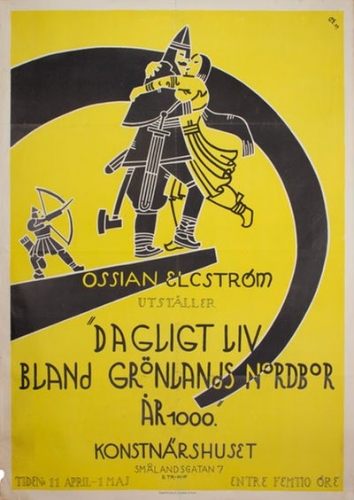
La géopolitique n’est cependant pas tout. Il existe également des raisons mythiques et psychologiques profondes de ne pas rompre les liens entre le Nord scandinave et l’Arctique. Le Groenland possède de riches traditions et une mythologie fascinante. Il existe aussi une tendance eurartique dans l’inconscient scandinave, comparable au « Drang nach Osten » allemand, les peuples nordiques s'étant maintesfois orientés vers le Nord. On peut citer ici l’expédition d’Andrée, l’intérêt authentique d’Ossian Elgström (photo) pour les Inuits et les Samis, ainsi que les descriptions d’Evola sur l’origine polaire, sur Hyperborée et Thulé. Nous avons déjà écrit sur ce sujet, notamment dans mes textes sur Ödun et l’ours polaire et sur la mythologie antarctique. Notre tradition vient ultérieurement des chasseurs de mammouths dans l’Arctique, et rompre les liens avec l’Arctique équivaudrait, psychologiquement et mythiquement, à une sorte d’effondrement.
20:57 Publié dans Actualité, Affaires européennes, Géopolitique | Lien permanent | Commentaires (0) | Tags : donald trump, groenland, états-unis, danemark, europe, actualité, affaires européennes, géopolitique, politique internationale |  |
|  del.icio.us |
del.icio.us |  |
|  Digg |
Digg | ![]() Facebook
Facebook
vendredi, 17 janvier 2025
Trump, Lénine et le combat libre de la politique mondiale
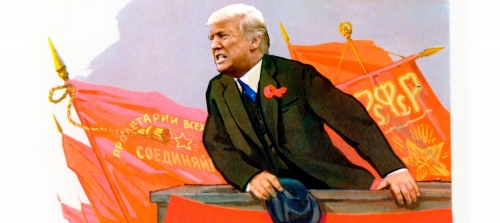
Trump, Lénine et le combat libre de la politique mondiale
Markku Siira
Source: https://markkusiira.com/2025/01/08/trump-lenin-ja-maailmanpolitiikan-vapaapaini/
« Avec le retour potentiel de Donald Trump, il pourrait être pertinent de tenter de mieux le comprendre », suggère Bruno Maçães, ancien ministre des Affaires européennes du Portugal, journaliste et écrivain. Selon lui, le phénomène Trump « n’est ni épisodique, ni véritablement déviant, mais frappant dans sa clarté ». Trump a une vision du pouvoir américain qu’il expose ouvertement.
Maçães estime que Trump considère que le pouvoir doit être exercé directement. Cela représente un changement radical par rapport au modèle précédent, où le pouvoir américain était (plus ou moins efficacement) dissimulé derrière des règles et des institutions. Jusqu’à présent, on s’appuyait sur des règles commerciales, des alliances militaires et des principes politiques.
« L’ordre international libéral » a été l’outil de l’hégémonie des États-Unis. Ces dernières années, il est devenu de plus en plus difficile pour Washington d’obtenir les résultats souhaités. Les États-Unis se sont retirés d’Afghanistan et les talibans sont revenus au pouvoir. La guerre en Ukraine pourrait se figer, tandis que l’influence de la Chine ne cesse de croître.
Dans cette période de bouleversements géopolitiques, un second mandat de Trump pourrait bien être marqué par une politique de puissance décomplexée, peu soucieuse de légitimité ou de normes. « Comment interpréter les horreurs de la guerre de Gaza, sinon comme une acceptation délibérée d’un pouvoir qui ne se soucie plus de la légalité, mais la remplace par un sentiment de supériorité civilisationnelle ? », s’interroge Maçães (photo).
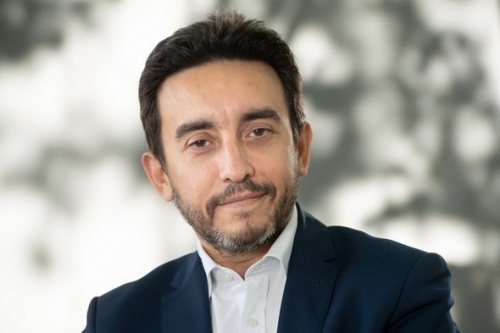
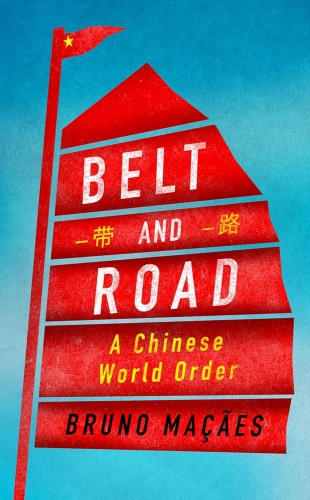
Le premier mandat de Trump, marqué par la pandémie, a désorienté beaucoup de monde. Cette fois, son imprévisibilité pourrait de nouveau servir les intérêts des élites du pouvoir. Comme l’ont révélé ses anciens conseillers, Trump « ne voit pas le monde comme une communauté globale régie par des règles et des institutions, mais comme une arène où les nations, les acteurs non étatiques et les entreprises s’affrontent ».
« Nous sommes au cœur d’un moment révolutionnaire », affirme Maçães, en se tournant dans ses réflexions vers la figure embaumée de Lénine, idéologue bolchévique. Lénine pensait qu’une « situation révolutionnaire » surgit lorsque les gouvernants deviennent incapables de gouverner, que les gouvernés ne supportent plus d’être dominés et que la résistance s’organise.
Dans l’actuel contexte de crises multiples, les « gouvernants », c’est-à-dire la classe politique occidentale au service de la corporatocratie, apparaissent incompétents et faibles. L’hégémonie américaine subit une forte pression, perceptible notamment dans le contexte ukrainien. Les États-Unis ont imposé des sanctions contre leurs rivaux, qui, dans ce « moment révolutionnaire », se sont unis face à un ennemi commun.
L’affaiblissement d’un pouvoir hégémonique crée inévitablement un sentiment de menace qui exige une réponse plus musclée. Ainsi, les démocraties occidentales adoptent rapidement les traits qu’elles projetaient sur leurs rivaux : le culte de la force et l’indifférence aux principes de légalité. « L’orientalisme est de retour », prédit Maçães.
Une époque instable favorise des joueurs comme Trump, qui ne se cachent plus derrière le masque d’un libéralisme hypocrite. L’élite qui gouverne le monde est, au moins pour le moment, prête à revenir à l’usage brutal de la force, aux instincts qui ont fait la grandeur originelle de l’Amérique. Dans ce processus de démantèlement de l’ancien ordre, Trump peut bien continuer à lancer des déclarations intempestives et à semer l’incertitude.
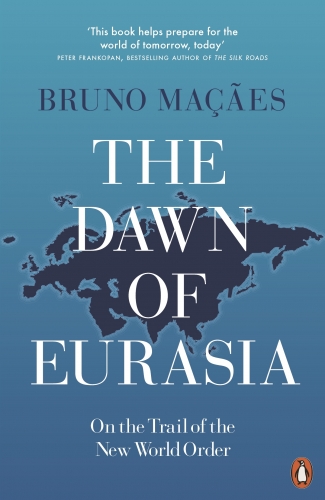
Maçães reste toutefois convaincu que tout ne se déroulera pas exactement comme prévu. L’usage de la force « consomme trop de ressources et engendre de nouvelles hostilités ». Il « éloigne les amis et les alliés, qui se sentent de plus en plus humiliés à mesure que les normes et les institutions qui reconnaissent leur statut sont abandonnées ».
Les véritables détenteurs du pouvoir préfèrent rester dans l’ombre, mais, à l’image d’un catcheur professionnel luttant pour divertir les foules, Trump a de nouveau été placé sous les projecteurs pour combattre, attirer l’attention, donner et recevoir des coups. Que sortira-t-il de ce spectacle ? On peut douter que cela fasse rire les euro-atlantistes.
18:15 Publié dans Actualité | Lien permanent | Commentaires (0) | Tags : bruno maçaes, donald trump, états-unis |  |
|  del.icio.us |
del.icio.us |  |
|  Digg |
Digg | ![]() Facebook
Facebook
Le « Trumpisme » et la subalternité proclamée de l'Europe
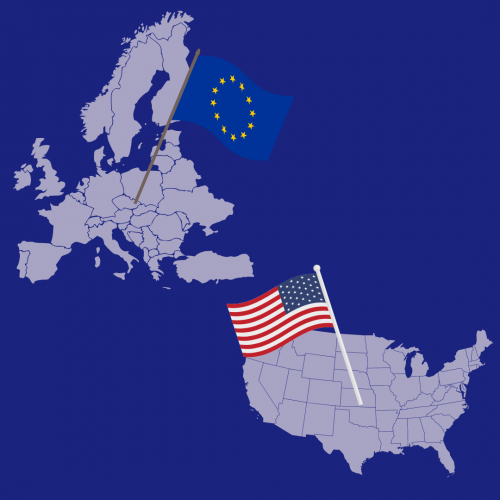
Le « Trumpisme » et la subalternité proclamée de l'Europe
par Daniele Perra
Source: https://www.ariannaeditrice.it/articoli/il-trumpismo-e-la...
Selon A. Douguine, le « Trumpisme » (qui assume le rang d'une véritable idéologie) serait une sorte de « force multipolariste passive », dans le sens où il n'aurait rien contre la réalisation d'un ordre mondial multipolaire et, par conséquent, ne ferait rien de concret pour l'empêcher. Une telle considération découlerait d'une interprétation problématique (à mon avis) de la soi-disant « doctrine Monroe » qui est (toujours à mon avis) indûment opposée à la « doctrine Wilson » ; comme si les deux approches géopolitiques étaient aux antipodes au sein de cet agglomérat que l'on pourrait très généralement définir comme l'« idéologie américaine » (fondée essentiellement sur les thèmes théologico-protestants de la « prédestination », de l'« exceptionnalisme » et du « mythe de la frontière »). Ayant lu (et non oublié) Carl Schmitt, en revanche, j'ai tendance à considérer la « Doctrine Monroe » comme la première manifestation réelle de l'impérialisme américain et, par conséquent, la « Doctrine Wilson » comme son évolution, pas nécessairement en contraste avec la première.

Schmitt rappelle d'ailleurs que l'insistance sur le thème de la « prédestination » (la croyance en la « prédestination ») n'est « que l'intensification extrême de la conscience d'appartenir à un monde autre que le monde corrompu et condamné au déclin ». Il en fut ainsi pour les Pères pèlerins qui quittèrent l'Europe ; il en est ainsi pour le "Trumpisme", qui cherche à s'imposer comme une nouveauté par rapport à la "culture progressiste" décadente d'une partie des élites oligarchiques nord-américaines.
En ce sens, toujours selon A. Douguine, la nouvelle élection de Donald J. Trump représenterait une sorte de « révolution ». La réalité semble bien différente. Le « trumpisme », en effet, pour un étudiant attentif de la géopolitique (sous tous ses aspects), ne peut apparaître que comme l'une des innombrables formes de « reproduction constante des formes d'appartenance ». Prenons un exemple classique.
À la fin des années 1970, entre scandales et défaite désastreuse au Viêt Nam, les États-Unis semblaient avoir perdu leur élan vital en tant que leader du soi-disant « monde libre ». L'ascension de Ronald Reagan à la Maison Blanche (plus ou moins les mêmes années que le triomphe entrepreneurial hautement facilité de Trump) a été perçue comme le début d'une « nouvelle ère », sous la bannière d'un esprit patriotique renouvelé étroitement lié au mythe du marché libre et du néolibéralisme. Dans ce cas, les « espaces libres » du marché ont en quelque sorte remplacé l'esprit de conquête de la frontière et l'appropriation conséquente de nouveaux espaces. De même, l'élection de Trump est perçue par les « apologistes de l'Occident » comme une catharsis nécessaire à partir de laquelle redémarrer pour restructurer (et peut-être étendre) leur monde corrompu, éprouvé par la décadence, et proche de la défaite sur plusieurs théâtres.
A cet égard, il faut d'ailleurs rappeler que depuis la fin du 19ème siècle (au moment où le « mythe de la frontière » s'achève), des courants de pensée, qui ont vu le jour au sein des Etats-Unis, ont soutenu la thèse selon laquelle, pour rendre le rêve américain viable, il était (et est toujours) nécessaire que le « mythe de la frontière » susmentionné soit projeté vers l'extérieur afin de « reproduire constamment le sentiment d'une appartenance nouvelle et renouvelée » et de « continuer à vivre la tension réalisatrice » d'un « monde de lumière » (perçu comme tel -soit l'espace pensé à l'origine par les groupes protestants arrivés en Amérique du Nord) qui s'oppose naturellement au « monde des ténèbres » (c'est-à-dire tout le reste, tout ce qui n'a pas été créé par les protestants et qui ne l'a pas été; tout le reste, c'est-à-dire tout ce qui n'a pas été homologué à l'esprit américain).
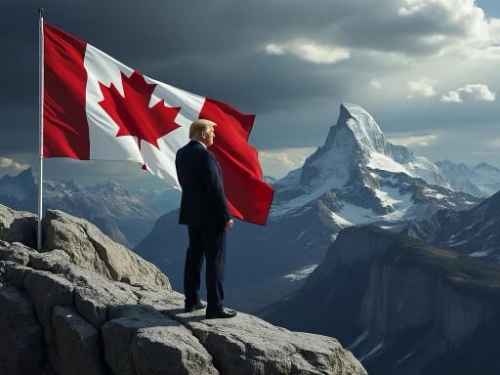
Le « trumpisme » n'est pas étranger à cette dynamique (pensez au rêve expansionniste vers l'Arctique, avec l'éventuelle et conséquente « territorialisation » de la mer Arctique elle-même). Au contraire, dans un monde où l'État (malgré la mondialisation) reste le détenteur privilégié de la force de coercition, le « Trumpisme » se manifeste comme la tentative ultime de donner à l'Occident hégémonisé par les États-Unis une structure pseudo-impériale dans laquelle les appareils de sécurité sont sous-traités à des agences privées directement liées au centre (à Washington, qui détient la suprématie technologique et économique au détriment des zones périphériques du « pseudo-empire »). Une chose que même les soi-disant « élites mondialistes » n'ont pas réussi à faire.
En d'autres termes, il se présente comme une étape supplémentaire vers la « démocratie dirigée »: une forme politique centrée sur des formes de surveillance numérique dans laquelle les élites ploutocratiques utilisent la technologie informatique et les algorithmes pour réduire l'expérience humaine à des facteurs mesurables, observables et (naturellement) manipulables.
De plus, la prétendue ouverture à la « liberté d'opinion » sur les plateformes de Musk et Zuckerberg ne doit pas tromper ici.
Par conséquent, le prétendu « multipolarisme trumpiste » se résout en une « construction idéale » dans laquelle non seulement les États-Unis maintiennent inchangée leur primauté hégémonique d'appropriation spatiale et de force coercitive au niveau mondial, mais solidifient davantage leur contrôle sur l'Europe: la véritable victime sacrificielle sur l'autel de leur restructuration politique, économique et industrielle.
15:52 Publié dans Actualité, Affaires européennes | Lien permanent | Commentaires (0) | Tags : actualité, affaires européennes, europe, états-unis, donald trump |  |
|  del.icio.us |
del.icio.us |  |
|  Digg |
Digg | ![]() Facebook
Facebook
jeudi, 16 janvier 2025
Le Groenland, une obsession américaine

Le Groenland, une obsession américaine
Binoy Kampmark
Ex: geopolitika. ru
L'histoire montre que les empires acquièrent des territoires de différentes manières. Les dynasties étendent leurs possessions par le biais de mariages, comme l'ont fait les Habsbourg. Ou les territoires sont pris par la force des armes ou volés par des traités trompeurs et des manœuvres douteuses. Ils peuvent également être achetés.
Les États-Unis ont étendu une grande partie de leur territoire en l'achetant et en se dotant ainsi d'un empire. L'acquisition de la Louisiane en 1803 pour la modique somme de 15 millions de dollars était audacieuse, opportuniste et extra-légale. Elle a également été initiée par un président américain qui avait romantiquement insisté pour que la jeune république se limite à des activités agricoles dans le cadre d'un modèle ne prévoyant que de petits exploitants. Mais Thomas Jefferson pouvait être rusé et diabolique, et la France, alors sous la férule de Napoléon Bonaparte, l'inquiétait : « Il n'y a qu'un seul endroit sur le globe dont le possesseur est notre ennemi naturel et habituel, et c'est la Nouvelle-Orléans ».
Bonaparte, dont les intérêts sont davantage tournés vers l'Europe, est prêt à céder le territoire pour une somme modique. Les indigènes, bien sûr, ne sont pas consultés. Jefferson, qui avait auparavant prôné la nécessité de respecter la Constitution avec une pieuse méticulosité, l'ignore lorsqu'il s'agit d'acheter des territoires, ce qui n'est pas explicitement autorisé par le document constitutionnel. C'est ainsi qu'apparaissent les premiers signes d'une présidence impériale.
En 1868, l'œil avide du gouvernement américain a montré que la conquête et le contrôle du continent ne se limitaient pas exclusivement à l'expansion vers l'ouest qui, selon l'observation hautaine de Frederick Jackson Turner, finirait par s'achever. Les désirs d'expansion se tournent vers l'Islande et le Groenland comme options possibles vers l'est.
Une publication du département d'État de 1868, éditée par Benjamin Mills Pierce, fait état d'un intérêt plus que passager pour les ressources de l'Islande et du Groenland, en mentionnant le traité par lequel le Danemark devait céder aux États-Unis le contrôle des îles de Saint-Thomas et de Saint-Jean dans les Caraïbes. Le rapport de 1868 encourage l'acquisition du Groenland pour deux raisons importantes : les opportunités commerciales promises par l'exploitation de l'abondance naturelle de « baleines, morses, phoques et requins, morues, saumons, truites et harengs » et la congruence politique de l'obtention d'un territoire flanqué « de l'Amérique britannique dans l'Arctique et le Pacifique ». Le Groenland pourrait ainsi « faire partie de l'Union » et diminuer l'influence britannique dans la région.
Le traité avec le Danemark concernant les Indes occidentales danoises rappelle que les choses ne seront pas faciles. L'acquisition de ce qui allait devenir les îles Vierges américaines était une idée du secrétaire d'État William Henry Seward, une initiative qui avait la bénédiction du département d'État américain. Le destin du traité a été mouvementé : le rejet initial du Sénat américain, principalement motivé par le soutien apporté par Seward au président Andrew Jackson lors de sa procédure de destitution, a été suivi par le rejet du Danemark en 1902. Des doutes subsistaient également quant à l'organisation d'un plébiscite pour les habitants de la région, le Danemark craignant ce que la vie sous la domination américaine pourrait réserver aux habitants noirs, dont on prédisait qu'ils auraient la réputation d'être peu généreux à l'égard des races de couleur.
La Première Guerre mondiale a finalement abouti au transfert officiel des Antilles danoises le 31 mars 1917, accompagné de 25 millions de dollars en pièces d'or, un résultat obtenu en partie grâce aux tactiques d'intimidation du secrétaire d'État américain Robert Lansing. Le secrétaire d'État n'a pas caché que l'une des intentions de l'occupation des îles était d'éviter qu'elles ne tombent aux mains des Allemands.

L'intérêt pour l'acquisition du Groenland s'est développé au cours de la Seconde Guerre mondiale. Une fois de plus, les inquiétudes concernant l'Allemagne sont au premier plan, étant donné qu'elle a occupé le Danemark sans incident en 1940. Les États-Unis ont alors construit la base aérienne de Thulé en 1943. À la fin de la guerre, l'administration Truman n'a pas réussi à séduire les Danois avec un prix d'achat de 100 millions de dollars, bien que la base ait continué à fonctionner sous le contrôle des États-Unis et avec la bénédiction du royaume.
Pendant le premier mandat de Donald Trump, l'obsession de l'achat du Groenland a refait surface comme le fait une éruption cutanée, et l'acquisition du Groenland a été comparée à « un contrat d'achat et de vente d'un grand terrain ». Le Danemark, a suggéré M. Trump, s'est retrouvé avec le Groenland « à perte, et stratégiquement, ce serait une bonne chose pour les États-Unis ».
Selon la plupart des comptes rendus, l'accord avait moins à voir avec la realpolitik qu'avec l'immobilier. Selon le récit de Peter Baker et Susan Glasser sur les événements du premier mandat de Trump, le Danemark recevrait en échange le territoire ignoré de Porto Rico. Ils suggèrent également que cette proposition audacieuse émane d'un vieil ami du président, Ronald Lauder, héritier de l'empire cosmétique Estée Lauder. Trump, dans son style typique, insiste sur le fait qu'il s'agit de sa propre idée.
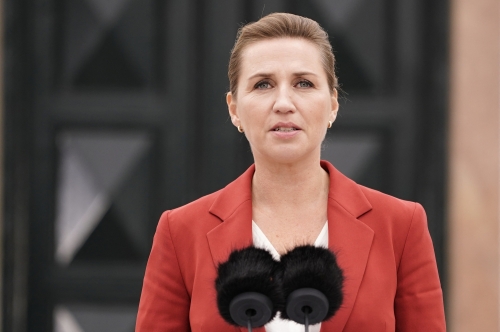
Comme on pouvait s'y attendre, M. Trump a trouvé la première ministre danoise, Mette Frederiksen (photo), peu impressionnée, réticente et « désagréable ». Pour sa part, la première ministre danoise a déclaré que "le temps d'acheter et de vendre d'autres pays et d'autres populations est révolu. Restons-en là".
Le retour imminent de Trump à la Maison Blanche a ravivé de vieilles idiosyncrasies. Pendant la période des fêtes de décembre 2024, il s'est laissé emporter par des fantasmes jeffersoniens et a promis de reprendre le canal de Panama, qui, selon lui, est exploité illégalement, bien qu'aimablement, par « les merveilleux soldats de la Chine », ainsi que de faire du Canada le 51ème État, avec l'ancien joueur de hockey professionnel Wayne Gretzky installé comme gouverneur, et d'acheter le Groenland.
Le choix du président élu pour le poste d'ambassadeur des États-Unis au Danemark est apparemment basé sur la cour faite à Copenhague, tandis que Trump déclare que la propriété du territoire par Washington est une « nécessité absolue ». Le premier ministre du Groenland, Múte Egede, laisse entendre qu'un tel projet a peu de chances d'aboutir: "Le Groenland est à nous. Nous ne sommes pas à vendre et nous ne le serons jamais". En politique, il est dangereux d'être sans équivoque.

En avril de l'année dernière, la base aérienne de Thulé a changé de nom pour devenir la base spatiale de Pituffik, dans un souci de sensibilité culturelle qui a fait couler beaucoup d'encre. Le ministère de la défense a affirmé que ce changement reconnaissait mieux « l'héritage culturel groenlandais » et reflétait de manière plus appropriée « son rôle dans les forces spatiales américaines ». Le patrimoine culturel groenlandais joue un rôle mineur dans la vision impériale de la base, dont les forces spatiales américaines insistent sur le fait qu'elle « permet la supériorité spatiale » grâce à ses systèmes d'alerte aux missiles, à sa défense antimissile et à ses missions de reconnaissance et de surveillance aérospatiales.
En l'état, la possession du Groenland, au sens officiel, n'a guère d'importance, et la seconde administration Trump agirait sagement en laissant simplement les Danois s'occuper des glaciers et de leurs problèmes. Washington a déjà ce dont il a besoin, et même plus que ce dont il a besoin.
Publié à l'origine dans Counterpunch. Traduction : Àngel Ferrero.
Source : https://www.elsaltodiario.com/estados-unidos/groenlandia-...
13:02 Publié dans Actualité, Affaires européennes, Géopolitique | Lien permanent | Commentaires (0) | Tags : actualité, états-unis, donald trump, groenland, danemark, europe, affaires européennes |  |
|  del.icio.us |
del.icio.us |  |
|  Digg |
Digg | ![]() Facebook
Facebook


